theartsdesk on Vinyl 86: Molly Tuttle, Depeche Mode, Pharoah Sanders, Seefeel, Hinds, Sofi Tukker and more | reviews, news & interviews
theartsdesk on Vinyl 86: Molly Tuttle, Depeche Mode, Pharoah Sanders, Seefeel, Hinds, Sofi Tukker and more
theartsdesk on Vinyl 86: Molly Tuttle, Depeche Mode, Pharoah Sanders, Seefeel, Hinds, Sofi Tukker and more
Britain's premier vinyl record reviews

VINYL OF THE MONTH
Hannah Scott Absence of Doubt (Fancourt Music)
 Sometimes a singer comes along who’s not stylistically my thing at all, but their voice has a quality that wrenches, reaches inside, beyond usual taste judgements. For me, a good example would be Kirsty MacColl who, excepting the hits, I came to later in life. There is a similarly direct potency to the voice of Suffolk-raised, London-based singer Hannah Scott. Hers is a crystal-clear instrument, beautiful in the classical sense, words crisply enunciated, but also riven with whatever it is in her life that’s made her who she is. In other words, she combines traditional, virtuosic musicality with a quality that yanks at our universal humanity. Soul... but in the descriptive sense rather than the classic Afro-American genre. On her latest album the arrangements are often too over-lush for my tastes, epic rock touches, big strings and chorales, but the songs are solid, lyrically tight, including a gorgeous ode to growing older (“Lines”). I’d have preferred much simpler singer-songwriterly versions, but if this album grabs the attention of whoever now arbitrates middle-of-the-road pop tastes, that’d be a fine thing too. Hannah Scott has what it takes to be a superstar in the Adele mode.
Sometimes a singer comes along who’s not stylistically my thing at all, but their voice has a quality that wrenches, reaches inside, beyond usual taste judgements. For me, a good example would be Kirsty MacColl who, excepting the hits, I came to later in life. There is a similarly direct potency to the voice of Suffolk-raised, London-based singer Hannah Scott. Hers is a crystal-clear instrument, beautiful in the classical sense, words crisply enunciated, but also riven with whatever it is in her life that’s made her who she is. In other words, she combines traditional, virtuosic musicality with a quality that yanks at our universal humanity. Soul... but in the descriptive sense rather than the classic Afro-American genre. On her latest album the arrangements are often too over-lush for my tastes, epic rock touches, big strings and chorales, but the songs are solid, lyrically tight, including a gorgeous ode to growing older (“Lines”). I’d have preferred much simpler singer-songwriterly versions, but if this album grabs the attention of whoever now arbitrates middle-of-the-road pop tastes, that’d be a fine thing too. Hannah Scott has what it takes to be a superstar in the Adele mode.
VINYL REVIEWS
Molly Tuttle & Golden Highway Into the Wild EP (Nonesuch) + Charley Crockett $10 Cowboy (Son of Davy/Thirty Tigers) + Kelley Swindall Live at the Jenny (Jenny Lind/Property of the Lost)
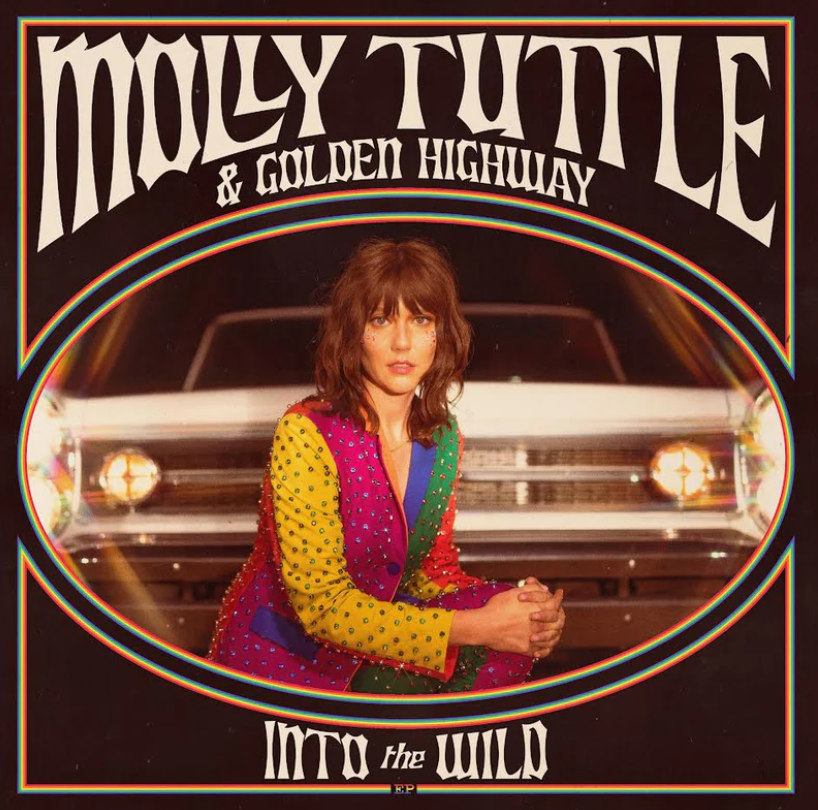 Three pleasing slices of Americana. The always enlivening Molly Tuttle returns with a six-track EP, following last year’s more-ish City of Gold album (still played regularly at theartsdesk on Vinyl Mansions). Only one song here hails from that, a pared back Down the Rabbit Hole version of “Strange Things”. The EP also contains previously released cover versions, smashing takes on Jefferson Airplane’s “White Rabbit” and Olivia Rodrigo’s “Good 4 U”, but the rest is fresh material, notably “Into the Wild”, an elegy for American landscapes lost to modernism, and the country’n’western love song “Here in California”, featuring her brother Jack, as well as AJ Lee of AJ Lee & Blue Summit. The great thing about Tuttle is she’s not only a bluegrass virtuoso, in the technically skilled sense, but she has such a fab way with lyrics and songwriting. Texan
Three pleasing slices of Americana. The always enlivening Molly Tuttle returns with a six-track EP, following last year’s more-ish City of Gold album (still played regularly at theartsdesk on Vinyl Mansions). Only one song here hails from that, a pared back Down the Rabbit Hole version of “Strange Things”. The EP also contains previously released cover versions, smashing takes on Jefferson Airplane’s “White Rabbit” and Olivia Rodrigo’s “Good 4 U”, but the rest is fresh material, notably “Into the Wild”, an elegy for American landscapes lost to modernism, and the country’n’western love song “Here in California”, featuring her brother Jack, as well as AJ Lee of AJ Lee & Blue Summit. The great thing about Tuttle is she’s not only a bluegrass virtuoso, in the technically skilled sense, but she has such a fab way with lyrics and songwriting. Texan 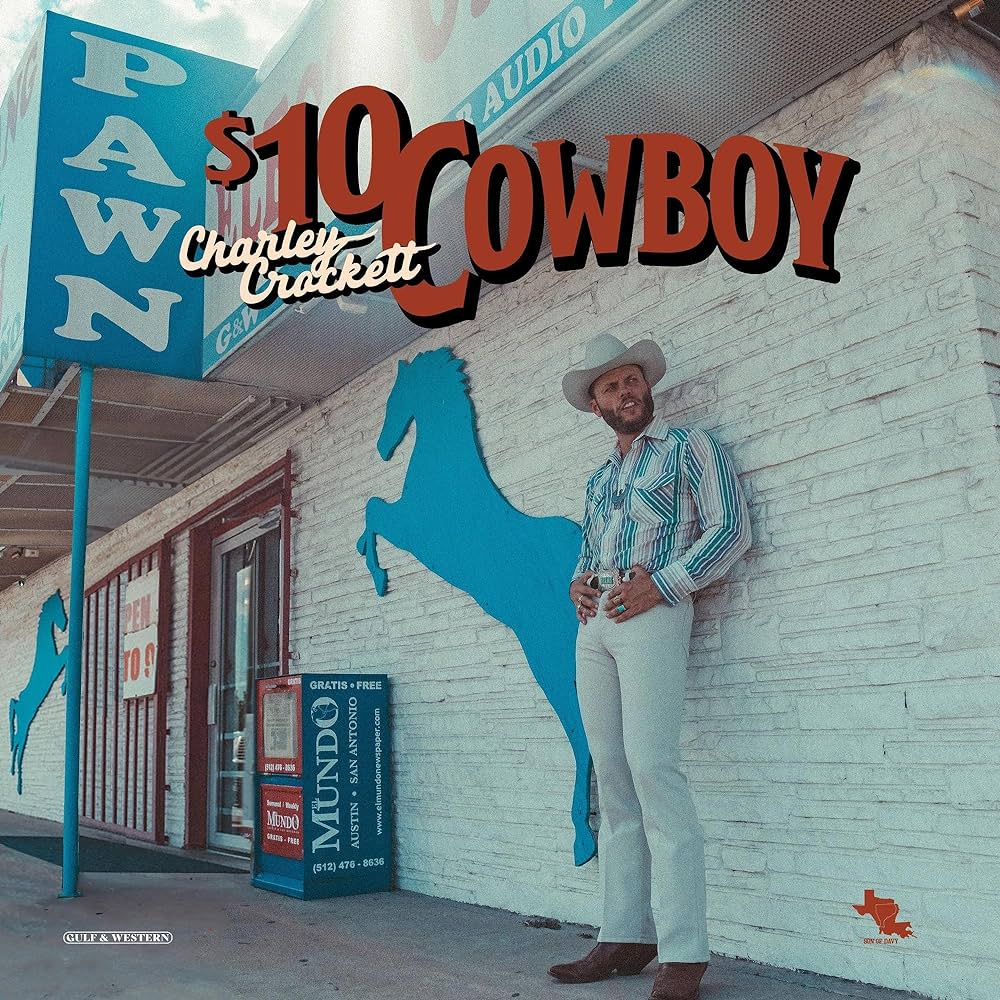 singer Charley Crockett is nothing if not prolific. He’s had 14 albums within the just-over-a-decade since his career kicked off (including the sequel to this album $10 Cowboy Chapter II: Visions of Dallas – the original album took a while to make it to vinyl). He mingles old-fashioned country’n’western twang and songwriting, with a small lathering of something akin to Memphis rhythm’n’blues. His unlaboured, taking-his-own-Goddamn-time, Texan-drawled singing is a delight, With songs called “Good at Losing”, “Diamond in the Rough”, “Solitary Road” and “Midnight Cowboy”, and lyrics such as “them riverboats make a lonesome sound”, you know what you’re getting. And Charley Crockett delivers. If you’re up for it, he nails it. Comes with a 10” x 10” photo/info insert. Crossing back over the Atlantic, Georgia-born, New York-based singer Kelley
singer Charley Crockett is nothing if not prolific. He’s had 14 albums within the just-over-a-decade since his career kicked off (including the sequel to this album $10 Cowboy Chapter II: Visions of Dallas – the original album took a while to make it to vinyl). He mingles old-fashioned country’n’western twang and songwriting, with a small lathering of something akin to Memphis rhythm’n’blues. His unlaboured, taking-his-own-Goddamn-time, Texan-drawled singing is a delight, With songs called “Good at Losing”, “Diamond in the Rough”, “Solitary Road” and “Midnight Cowboy”, and lyrics such as “them riverboats make a lonesome sound”, you know what you’re getting. And Charley Crockett delivers. If you’re up for it, he nails it. Comes with a 10” x 10” photo/info insert. Crossing back over the Atlantic, Georgia-born, New York-based singer Kelley 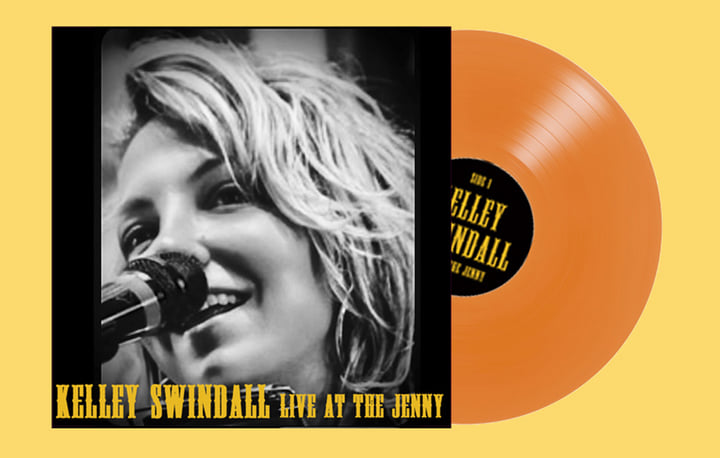 Swindall regularly tours the UK and on 22nd May this year, her set at Hastings “free entry music bar” The Jenny Lind, was recorded. It appears as the second of local label Property of the Lost’s 300-run limited edition Live at the Jenny vinyl specials. Sounding raw but clear, a light burble of chat in the very back, with Swindall on acoustic guitar and harmonica, it’s a fine set, including enjoyably wry inter-song chat, Bob Dylan’s “Things Have Changed” and the old standards “St James Infirmary” and “House of the Rising Sun”. But mostly it’s her own songs, American Gothic numbers marinated in death and bad behaviour and concluding with Dixieland-ish frolic of “We’re Gonna Die”. Comes on orange vinyl.
Swindall regularly tours the UK and on 22nd May this year, her set at Hastings “free entry music bar” The Jenny Lind, was recorded. It appears as the second of local label Property of the Lost’s 300-run limited edition Live at the Jenny vinyl specials. Sounding raw but clear, a light burble of chat in the very back, with Swindall on acoustic guitar and harmonica, it’s a fine set, including enjoyably wry inter-song chat, Bob Dylan’s “Things Have Changed” and the old standards “St James Infirmary” and “House of the Rising Sun”. But mostly it’s her own songs, American Gothic numbers marinated in death and bad behaviour and concluding with Dixieland-ish frolic of “We’re Gonna Die”. Comes on orange vinyl.
Elvin Jones and Richard Davis Heavy Sounds (Verve/Universal) + Pharoah Sanders Thembi (Verve/Univeral)
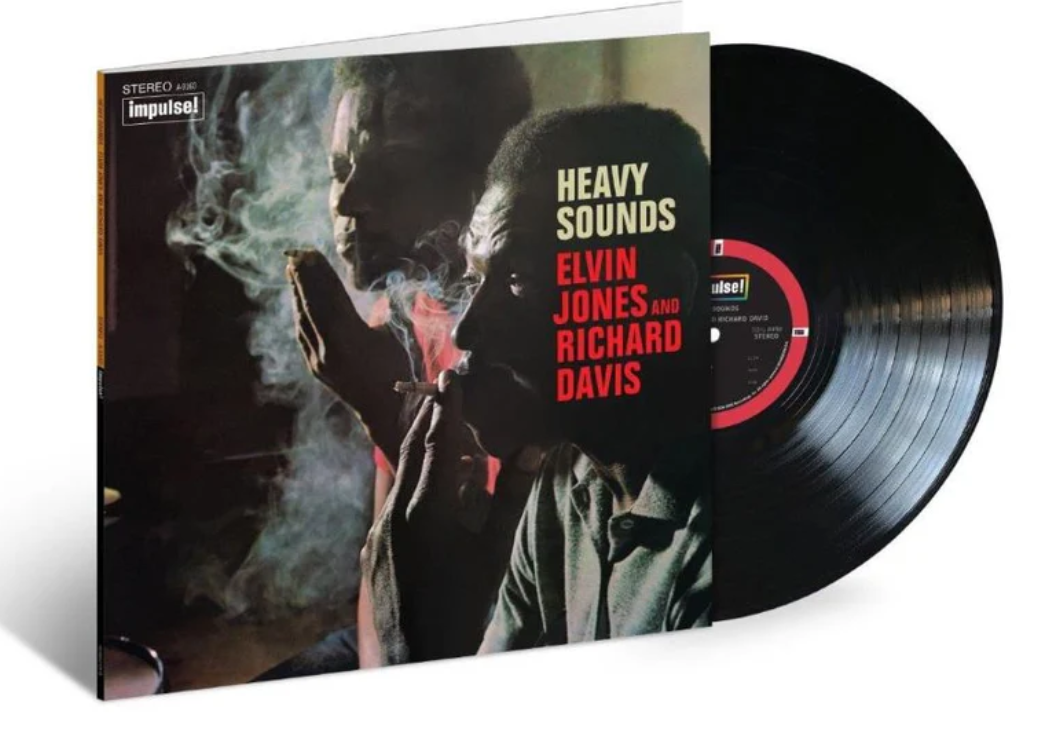 Two golden era jazz recordings from Verve. Drummer Elvin Jones, having left John Coltrane’s quartet a year earlier, recorded, Heavy Sounds in summer 1967 (about a month, as it happened, before Coltrane passed away). Together with Richard Davis, a double bassist as at-home with classical greats (such as Stravinsky) as he was with jazz, he delivers a six-track set that’s as smoky late-night as the cover art. The pair are ably assisted by sax from Frank Foster and piano from one Billy Greene, but, as is proved on the epic abstract unpicking of the Gershwin standard “Summertime”, they are as capable of going off on their own mission as a pair. Other highlights include the saxy “Shiny Stockings”, the more experimental “Raunchy Rita”, and Jones taking to the guitar in “Elvin’s guitar Blues”. It’s a rich snapshot of a time and place. Comes in photo gatefold with extensive notes. Well-established in his solo career by 1970, following the death of his
Two golden era jazz recordings from Verve. Drummer Elvin Jones, having left John Coltrane’s quartet a year earlier, recorded, Heavy Sounds in summer 1967 (about a month, as it happened, before Coltrane passed away). Together with Richard Davis, a double bassist as at-home with classical greats (such as Stravinsky) as he was with jazz, he delivers a six-track set that’s as smoky late-night as the cover art. The pair are ably assisted by sax from Frank Foster and piano from one Billy Greene, but, as is proved on the epic abstract unpicking of the Gershwin standard “Summertime”, they are as capable of going off on their own mission as a pair. Other highlights include the saxy “Shiny Stockings”, the more experimental “Raunchy Rita”, and Jones taking to the guitar in “Elvin’s guitar Blues”. It’s a rich snapshot of a time and place. Comes in photo gatefold with extensive notes. Well-established in his solo career by 1970, following the death of his 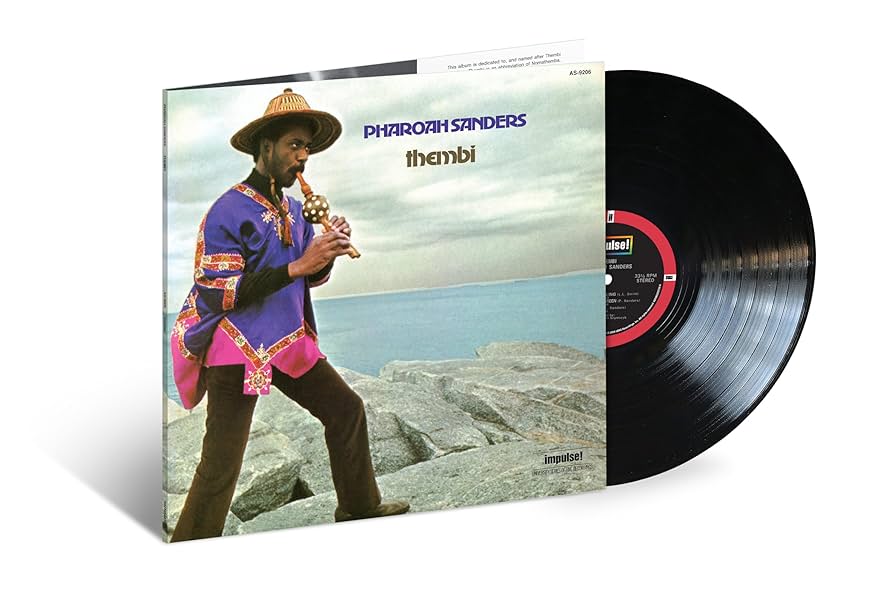 mentor, Coltrane, Pharoah Sanders focused in on Afro-spirituality on Thembi, an album titled for his South African wide Novathembi. 14 years before the birth of Shabaka Hutchings, he was also keen on experimenting with the flute, rather than his regular saxophone. Adding richness to the whole is Lonnie Liston Smith, especially on the proto-chill-out of “Astral Travelling”, while there’s fabulous bass-work from Cecil McBee throughout, especially on “Love”. Excepting “Red, Black & Green”, the more dissonant aspects of Sanders’ playing are kept in check in favour of a warm, fruity mellowness, albeit the final track, “Bailophone Dance”, is a boundary-testing dip into tribalistic percussion. Comes in Photo/info gatefold.
mentor, Coltrane, Pharoah Sanders focused in on Afro-spirituality on Thembi, an album titled for his South African wide Novathembi. 14 years before the birth of Shabaka Hutchings, he was also keen on experimenting with the flute, rather than his regular saxophone. Adding richness to the whole is Lonnie Liston Smith, especially on the proto-chill-out of “Astral Travelling”, while there’s fabulous bass-work from Cecil McBee throughout, especially on “Love”. Excepting “Red, Black & Green”, the more dissonant aspects of Sanders’ playing are kept in check in favour of a warm, fruity mellowness, albeit the final track, “Bailophone Dance”, is a boundary-testing dip into tribalistic percussion. Comes in Photo/info gatefold.
Sofi Tukker Be Really Energetic and Dance (Sofi Tukker LLC)
 Theartsdesk on Vinyl is not sent nearly enough contemporary femme-fronted pop music. Partly this is because a lot of it doesn’t make it to plastic until it’s already become popular. Happily, the fourth album from New York-based duo Sofi Tucker was sent our way. Consisting of Sophie Tucker-Weld and Tucker Halpern, they have something in common with Confidence Man but without that band's stylistic focus on Euro-cheese and old rave music. Instead, Sofi Tucker create a deliciously catchy modernist dance-pop, interwoven with Latin flavour (and lyrics – Tucker-Weld is well-travelled and spent much time in Brazil). Be Really Energetic and Dance is a juicy frolic that deserves to blow up beyond the club charts. Comes on white vinyl in photo-art gatefold and die-cut red info inner sleeve with a 12” x 12” four-page photo/lyric booklet.
Theartsdesk on Vinyl is not sent nearly enough contemporary femme-fronted pop music. Partly this is because a lot of it doesn’t make it to plastic until it’s already become popular. Happily, the fourth album from New York-based duo Sofi Tucker was sent our way. Consisting of Sophie Tucker-Weld and Tucker Halpern, they have something in common with Confidence Man but without that band's stylistic focus on Euro-cheese and old rave music. Instead, Sofi Tucker create a deliciously catchy modernist dance-pop, interwoven with Latin flavour (and lyrics – Tucker-Weld is well-travelled and spent much time in Brazil). Be Really Energetic and Dance is a juicy frolic that deserves to blow up beyond the club charts. Comes on white vinyl in photo-art gatefold and die-cut red info inner sleeve with a 12” x 12” four-page photo/lyric booklet.
TONN3RR3 x BIKAY3 It’s a Bomb (Born Bad)
 In terms of commercial perversity, naming one’s band TONN3RR3 x BIKAY3 must be near the top. Not gonna remember that easily after a few pints when a pal asks what music I’d recommend. But, if I could haul their name to the forefront of my brain, recommend it I certainly would. TONN3RR3 are a Parisian electronic unit and BIKAY3 is the current handle of Congolese singer-musician Bony Bikaye. Back in the early Eighties, the latter recorded a groundbreaking new wave electronic album Noir et Blanc. Now he returns with a worthy sequel. Whispering, singing, quavering and moaning, he lays down his words over a sound bed of skittering Afro-grooves, the one exception being the four-to-the-floor club-centric “Are U OK?”. The latter is the least interesting thing on the album. House music is, currently, a very tired form, whereas more complex grooves drawn from the African continent offer a path to club music that holds more interest. Not all the music here is even danceable, with slivers of strange abstract electro-pop and much else, but it’s all worth a listen. Comes in lyric inner sleeve.
In terms of commercial perversity, naming one’s band TONN3RR3 x BIKAY3 must be near the top. Not gonna remember that easily after a few pints when a pal asks what music I’d recommend. But, if I could haul their name to the forefront of my brain, recommend it I certainly would. TONN3RR3 are a Parisian electronic unit and BIKAY3 is the current handle of Congolese singer-musician Bony Bikaye. Back in the early Eighties, the latter recorded a groundbreaking new wave electronic album Noir et Blanc. Now he returns with a worthy sequel. Whispering, singing, quavering and moaning, he lays down his words over a sound bed of skittering Afro-grooves, the one exception being the four-to-the-floor club-centric “Are U OK?”. The latter is the least interesting thing on the album. House music is, currently, a very tired form, whereas more complex grooves drawn from the African continent offer a path to club music that holds more interest. Not all the music here is even danceable, with slivers of strange abstract electro-pop and much else, but it’s all worth a listen. Comes in lyric inner sleeve.
Clark In Camera (Throttle)
 Film soundtracks are tricky beasts for album releases. Often what works brilliantly when accompanying onscreen drama, does not stand up by itself. There’s a reason it’s referred to as incidental music. Chris Clark, however, does an excellent job with his music for In Camera, Naqqash Khalid’s study of rejection in the world of actors and auditions. Clark started out as one of Warp Records’ stable of electronic explorers at the start of this century but has gone onto everything from installation art to modern classical ventures. In Camera hops about between vocalised downtempo electro-melancholia to grinding techno-rock to short piano interludes. I’ve not seen the film but, if it's as good as the soundtrack, which reviews I’ve read suggest is the case, it’s going to be a treat. Comes on lurid bright green vinyl.
Film soundtracks are tricky beasts for album releases. Often what works brilliantly when accompanying onscreen drama, does not stand up by itself. There’s a reason it’s referred to as incidental music. Chris Clark, however, does an excellent job with his music for In Camera, Naqqash Khalid’s study of rejection in the world of actors and auditions. Clark started out as one of Warp Records’ stable of electronic explorers at the start of this century but has gone onto everything from installation art to modern classical ventures. In Camera hops about between vocalised downtempo electro-melancholia to grinding techno-rock to short piano interludes. I’ve not seen the film but, if it's as good as the soundtrack, which reviews I’ve read suggest is the case, it’s going to be a treat. Comes on lurid bright green vinyl.
Kitty Liv Easy Tiger (Sunday Best)
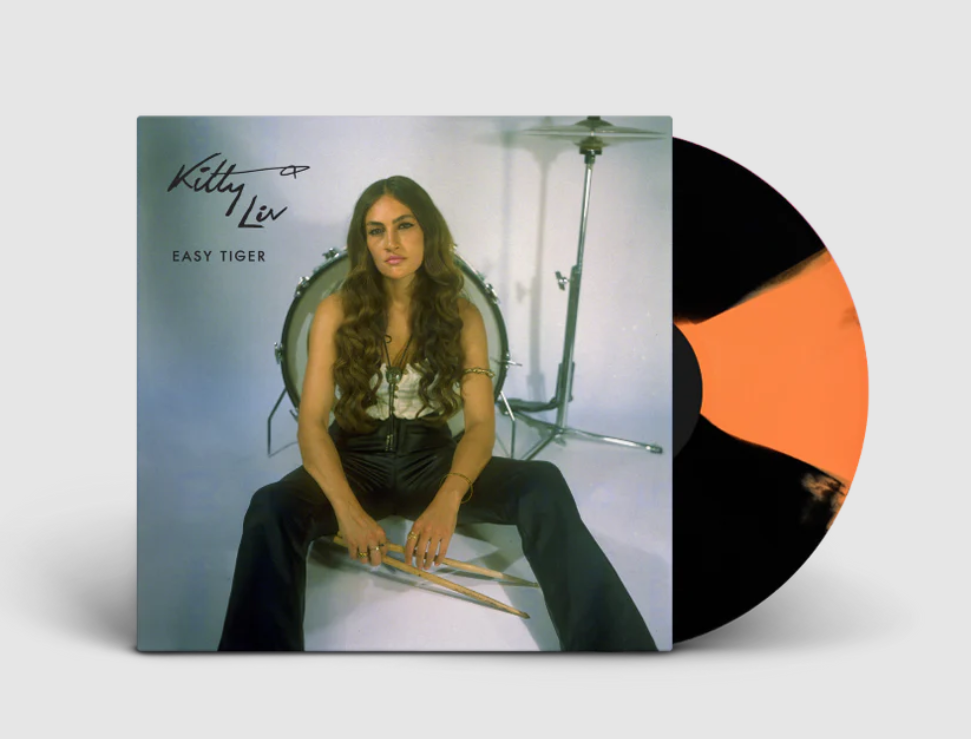 Kitty Liv of festival favourite sibling outfit Kitty, Daisy & Lewis fires out her debut solo album. Stepping away from the jump blues mash-up of her main band, the sound is playfully funky, a jazz-flecked rhythm & blues that veers towards soul music. It’s a slow-grower. I wasn’t convinced by the preceding single “Nothing On My Mind (But You Babe)”, which has a Style Council B-side vibe, but once bedded into the album as a whole, it’s much more convincing. Liv veers easily between Etta James-ish slowies and slinkin’ funkers more redolent of Stevie Wonder writing for Chaka Khan. Comes on mauve vinyl with a poster of the singer and her guitar.
Kitty Liv of festival favourite sibling outfit Kitty, Daisy & Lewis fires out her debut solo album. Stepping away from the jump blues mash-up of her main band, the sound is playfully funky, a jazz-flecked rhythm & blues that veers towards soul music. It’s a slow-grower. I wasn’t convinced by the preceding single “Nothing On My Mind (But You Babe)”, which has a Style Council B-side vibe, but once bedded into the album as a whole, it’s much more convincing. Liv veers easily between Etta James-ish slowies and slinkin’ funkers more redolent of Stevie Wonder writing for Chaka Khan. Comes on mauve vinyl with a poster of the singer and her guitar.
Various Miles Away: One (Miles Away) + Various Kampire: A Dancefloor in Ndola (Strut) + Various Everything Above the Sky: Astral Travelling with Luke Una (RE.WARM)
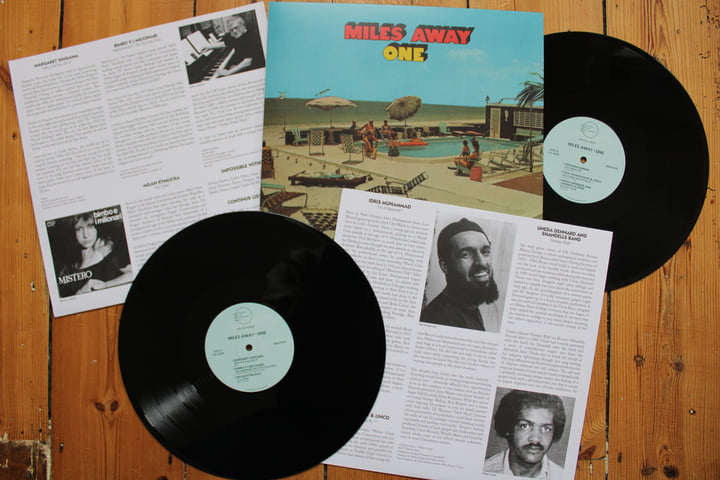 Three compilations of varying stripes, all doubles, the Kampire and Luke Una on gatefold. Miles Away: One is the opening comp shot by DJ and soulful crate-digger Dom Ore, whose day job as product manager for Demon Records allows him to search out all kinds of lost gems for his Miles Away label. This first collection states on the back cover that it won’t just be obscure for the sake of it, that some tracks are available relatively easily. However, as any music lover knows, interested parties often have to wade through piles of records to locate such tunes. Here, the emphasis is on soul and funk with a side order of Latin and quirky disco, ranging from the spiritual testimonial of Idris Muhammed’s “I’m a Believer” to the kitsch disco of Bimbo E I Milionari’s “Millionbimbo (Ric Piccolo Edit)” to the chunky funk-rockin’ “No Communication Pt. 2” by the bizarrely named True Transfusion & Linco.
Three compilations of varying stripes, all doubles, the Kampire and Luke Una on gatefold. Miles Away: One is the opening comp shot by DJ and soulful crate-digger Dom Ore, whose day job as product manager for Demon Records allows him to search out all kinds of lost gems for his Miles Away label. This first collection states on the back cover that it won’t just be obscure for the sake of it, that some tracks are available relatively easily. However, as any music lover knows, interested parties often have to wade through piles of records to locate such tunes. Here, the emphasis is on soul and funk with a side order of Latin and quirky disco, ranging from the spiritual testimonial of Idris Muhammed’s “I’m a Believer” to the kitsch disco of Bimbo E I Milionari’s “Millionbimbo (Ric Piccolo Edit)” to the chunky funk-rockin’ “No Communication Pt. 2” by the bizarrely named True Transfusion & Linco. 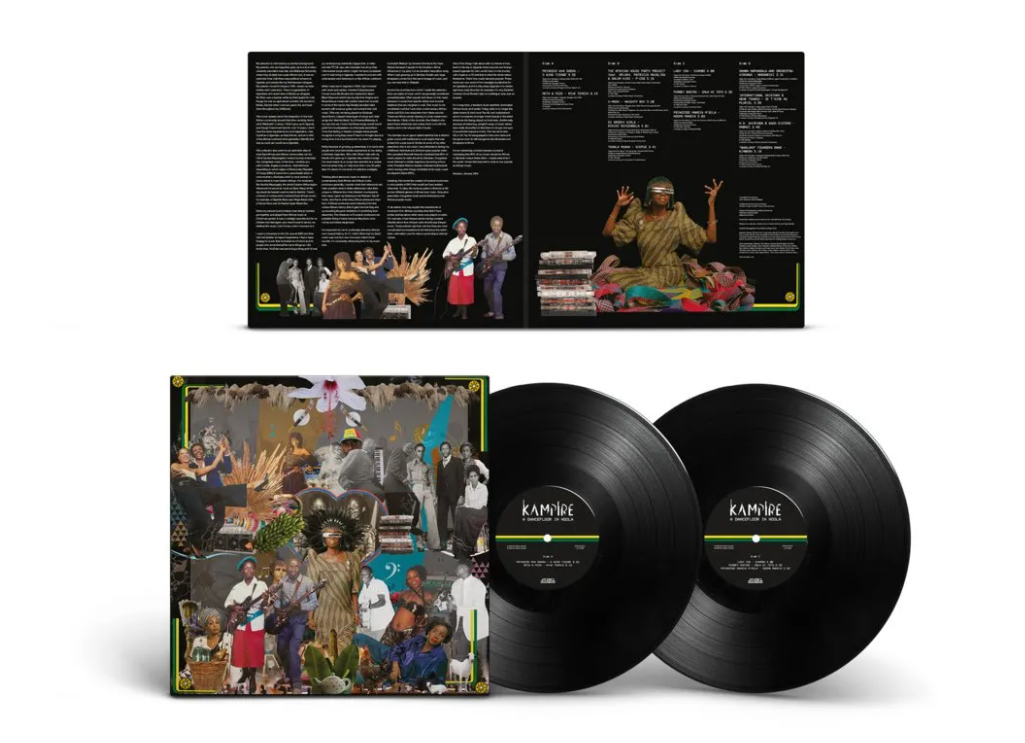 Comes in Photo/info inner sleeve. One of Uganda’s breakthrough DJs on the global club circuit, DJ Kampire, of the Nyege Nyege collective, presents 13 African songs which have influenced her sets. It’s a wonderfully eclectic selection which ranges through propulsive Zairean soukous from Princess Aya Sarah, an Afro-electro tune by South African TV star V-Mash, a hypno-drum workout by “Bwaluka” Founders Band from Zambia, and much more, including honey-sweet pop outings. It’s wide-ranging and full of juice. The gatefold contains track details, as well as Kampire explaining the background. Finally, Manc DJ and comp-
Comes in Photo/info inner sleeve. One of Uganda’s breakthrough DJs on the global club circuit, DJ Kampire, of the Nyege Nyege collective, presents 13 African songs which have influenced her sets. It’s a wonderfully eclectic selection which ranges through propulsive Zairean soukous from Princess Aya Sarah, an Afro-electro tune by South African TV star V-Mash, a hypno-drum workout by “Bwaluka” Founders Band from Zambia, and much more, including honey-sweet pop outings. It’s wide-ranging and full of juice. The gatefold contains track details, as well as Kampire explaining the background. Finally, Manc DJ and comp-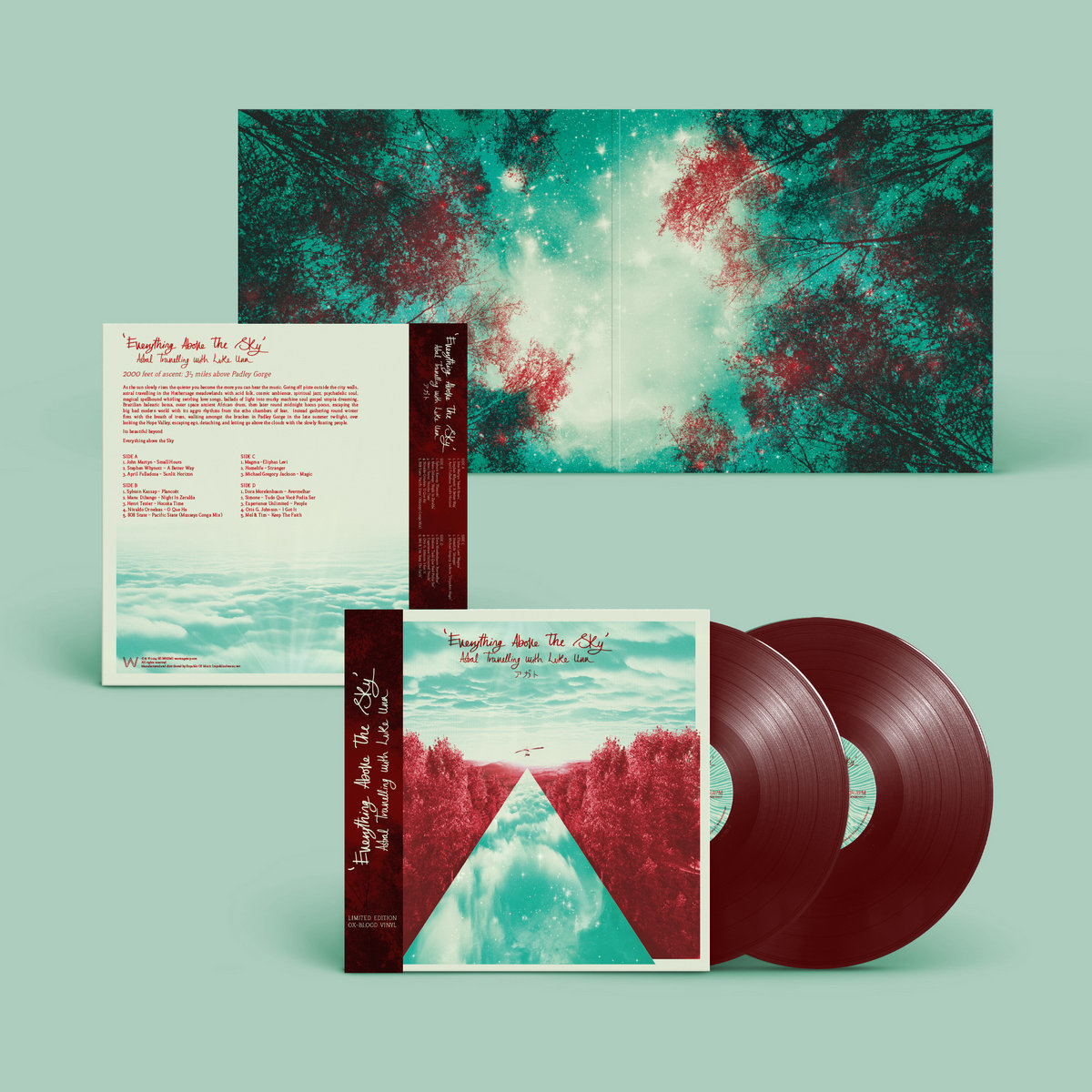 meister Luke Una returns with a delicious collection of pieces that writing on the back cover suggests will be food for “escaping the big bad modern world with its aggro rhythms” and “instead gathering around fires with the breath of trees”. The music does a good job of living up to the hippy hype, veering wherever Una fancies, from Manu Dibango’s early Seventies rhythm explorations to totally obscure singer-songwriter Stephen Whynott (513 monthly listeners on Spotify), to noodling slightly psychedelic prog-jazz fusion of equally obscure US guitarist Michael Gregory Jackson (993 monthly listeners on Spotify). It feels as if Luke Una’s back-to-mine is outside in the countryside, somewhere warm, accompanied by the aforementioned “breath of trees”. I’m in. Comes with a 12” x 12” insert featuring Una’s commentary on the songs.
meister Luke Una returns with a delicious collection of pieces that writing on the back cover suggests will be food for “escaping the big bad modern world with its aggro rhythms” and “instead gathering around fires with the breath of trees”. The music does a good job of living up to the hippy hype, veering wherever Una fancies, from Manu Dibango’s early Seventies rhythm explorations to totally obscure singer-songwriter Stephen Whynott (513 monthly listeners on Spotify), to noodling slightly psychedelic prog-jazz fusion of equally obscure US guitarist Michael Gregory Jackson (993 monthly listeners on Spotify). It feels as if Luke Una’s back-to-mine is outside in the countryside, somewhere warm, accompanied by the aforementioned “breath of trees”. I’m in. Comes with a 12” x 12” insert featuring Una’s commentary on the songs.
Chinese American Bear WAH!!! (Moshi Moshi) + Claude Fontaine La Mer (Innovative Leisure)
 Two delightful albums of laidback pop fronted by sweet female vocals. Chinese American Bear are the husband and wife team of Anne Wong and Bryce Barsten, based in Seattle. Their third album is great fun, unafraid of frothiness, as it traverses a sometimes saccharine bridging of bedroom electro-pop and cutesy indie. What saves it from overarching tweeness is catchy tunes and a likeable exuberance (albeit songs such as “Yummy Yummy Yummy” will be an acquired taste). Mingling Mandarin and English, WAH!!! unpretentiously alternates between the playful and the lovely. Comes on milkshake-pink vinyl. The eponymous 2019 debut album by not-unattractive
Two delightful albums of laidback pop fronted by sweet female vocals. Chinese American Bear are the husband and wife team of Anne Wong and Bryce Barsten, based in Seattle. Their third album is great fun, unafraid of frothiness, as it traverses a sometimes saccharine bridging of bedroom electro-pop and cutesy indie. What saves it from overarching tweeness is catchy tunes and a likeable exuberance (albeit songs such as “Yummy Yummy Yummy” will be an acquired taste). Mingling Mandarin and English, WAH!!! unpretentiously alternates between the playful and the lovely. Comes on milkshake-pink vinyl. The eponymous 2019 debut album by not-unattractive 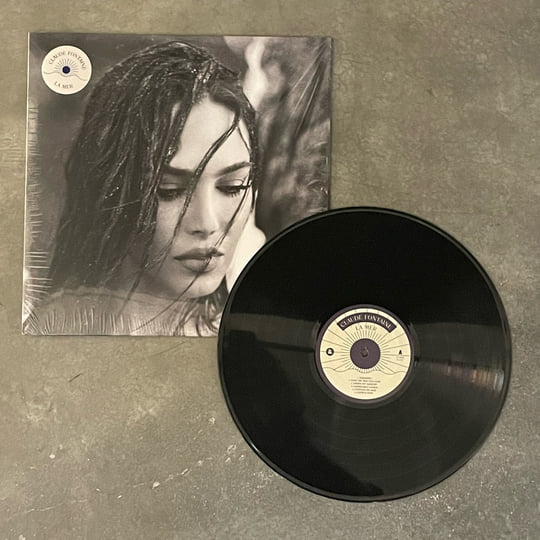 French chanteuse Claude Fontaine has been a regular in the beachside or early evening DJ sets of theartsdesk on Vinyl selector Caspar Gomez. It consists of one side of reggae tunes and one of Brazilian-flavoured songs. With lyrics in French, Portuguese and English, but mostly the latter, Fontaine’s singing on her second album is breathy, intimate and dainty. She balances easy listening frolics with sonic depth and contagious songwriting. She is assisted by the fact the studio was helmed by multi-Grammy Award-winning Grace Jones/Shakira/Baaba Maal producer Lester Mendez, and the band included alumni from the bands of King Tubby, Lee “Scratch” Perry, Sergio Mendes, Steel Pulse and others. Both these albums are sugary but also sunny and cheering.
French chanteuse Claude Fontaine has been a regular in the beachside or early evening DJ sets of theartsdesk on Vinyl selector Caspar Gomez. It consists of one side of reggae tunes and one of Brazilian-flavoured songs. With lyrics in French, Portuguese and English, but mostly the latter, Fontaine’s singing on her second album is breathy, intimate and dainty. She balances easy listening frolics with sonic depth and contagious songwriting. She is assisted by the fact the studio was helmed by multi-Grammy Award-winning Grace Jones/Shakira/Baaba Maal producer Lester Mendez, and the band included alumni from the bands of King Tubby, Lee “Scratch” Perry, Sergio Mendes, Steel Pulse and others. Both these albums are sugary but also sunny and cheering.
Nusrat Fateh Ali Khan & Party Chain of Light (Real World)
 It is one of global music’s tragedies that Nusrat Fateh Ali Khan, who brought the Sufi devotional music qawwali to an international audience, died in 1997 at only 48-years-old. Quite apart from anything else, I'd not immersed myself in his music by then, so never saw him live which, by all accounts, was an extraordinary experience. Happily, there’s plenty of his music available, and, with the release of these four tracks recorded in 1990 and “buried deep in a warehouse storage space at Real World Studios”, there’s now even more. Khan was descended from a 600 year heritage of qawwali singers and brings a strange and stunning combination of weight and elation to the force of his singing, backed by his nine-piece Party. Chain of Light contains one piece, “Ya Gaus Ya Meeran”, that he’d never recorded before and this version contains a raw energy. Khan was, at the time, in the process of exploring musical possibilities beyond the traditional, as well as what the studio process could do for him. He’s in peak form here and both fans and newbies are advised to lend an ear. Comes in an inner sleeve full of detailed background info, lyrics and photos.
It is one of global music’s tragedies that Nusrat Fateh Ali Khan, who brought the Sufi devotional music qawwali to an international audience, died in 1997 at only 48-years-old. Quite apart from anything else, I'd not immersed myself in his music by then, so never saw him live which, by all accounts, was an extraordinary experience. Happily, there’s plenty of his music available, and, with the release of these four tracks recorded in 1990 and “buried deep in a warehouse storage space at Real World Studios”, there’s now even more. Khan was descended from a 600 year heritage of qawwali singers and brings a strange and stunning combination of weight and elation to the force of his singing, backed by his nine-piece Party. Chain of Light contains one piece, “Ya Gaus Ya Meeran”, that he’d never recorded before and this version contains a raw energy. Khan was, at the time, in the process of exploring musical possibilities beyond the traditional, as well as what the studio process could do for him. He’s in peak form here and both fans and newbies are advised to lend an ear. Comes in an inner sleeve full of detailed background info, lyrics and photos.
Hinds Viva Hinds (Lucky Number)
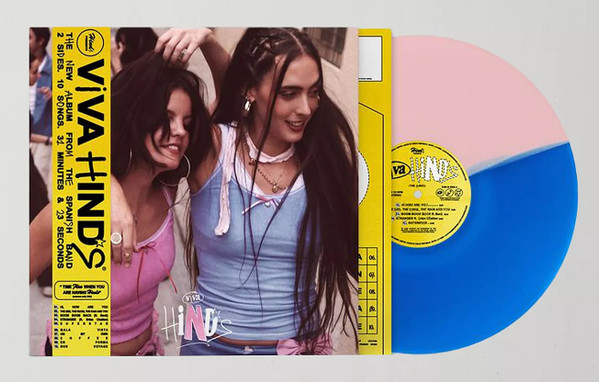 Spanish indie-rock duo Hinds have been around for at least a decade but their latest album sounds like it’s by a band just starting out. It has that lively debut zest and energy, as if they’ve tapped into whatever it was that made the two friends, Carlotta Cosials and Ana García Perrote, start the band in the first place. The pair went away with some Brit musician mates and recorded the album in a couple of rustic French cabins. It sounds that way. Not that it’s especially lo-fi but it has a devil-may-care effervescence. The best numbers are the ones that have a playful garage band zip to them, such as “Mala Vista” and “Boom Boom Back”, the latter featuring Beck. They sound like they’d be a riot in concert. Comes on vinyl that looks like bright pink paint thrown at a window pane, in photo inner sleeve, with a 12” x 12” info insert.
Spanish indie-rock duo Hinds have been around for at least a decade but their latest album sounds like it’s by a band just starting out. It has that lively debut zest and energy, as if they’ve tapped into whatever it was that made the two friends, Carlotta Cosials and Ana García Perrote, start the band in the first place. The pair went away with some Brit musician mates and recorded the album in a couple of rustic French cabins. It sounds that way. Not that it’s especially lo-fi but it has a devil-may-care effervescence. The best numbers are the ones that have a playful garage band zip to them, such as “Mala Vista” and “Boom Boom Back”, the latter featuring Beck. They sound like they’d be a riot in concert. Comes on vinyl that looks like bright pink paint thrown at a window pane, in photo inner sleeve, with a 12” x 12” info insert.
“Deadly" Headley Bennett 35 Years From Alpha (On-U Sound) + Harry Beckett The Modern Sound of Harry Beckett (On-U Sound)
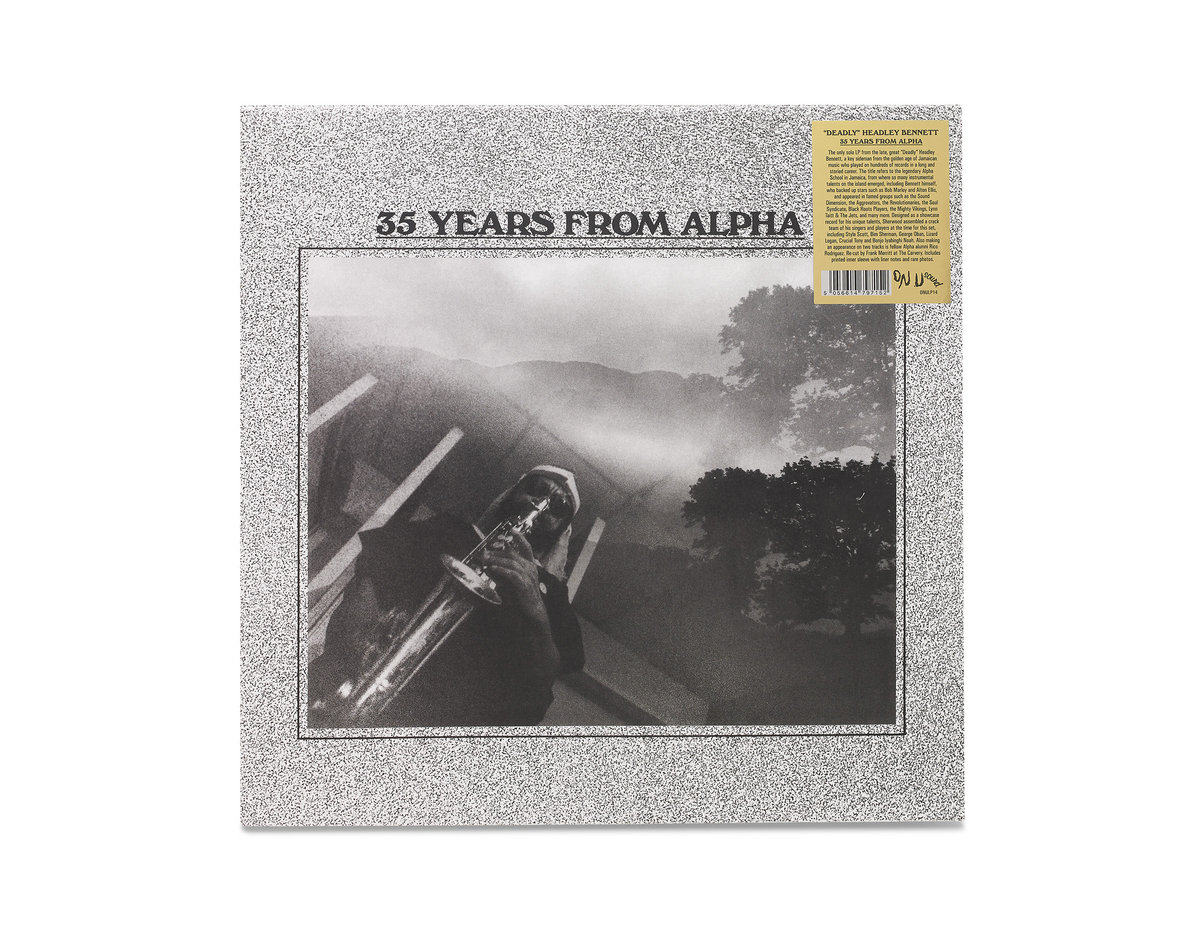 Reissues of two albums that On-U maestro Adrian Sherwood made with a couple of great (and now late) brass players from the West Indies. “Deadly” Headley Bennett was a product of Jamaica’s famed Alpha School (hence the album title), an institution that produced a who’s who of reggae brass-players. For decades he played with almost everyone in reggae, from Augustus Pablo to Horace Andy to Bob Marley’s first single. At the start of the 1980s, working with Prince Far-I, he came into the On-U milieu in London and Sherwood couldn’t resist cutting a solo album. This came out in 1982 and features a couple of lovely Bim Sherman vocals. By Sherwood’s standards,
Reissues of two albums that On-U maestro Adrian Sherwood made with a couple of great (and now late) brass players from the West Indies. “Deadly” Headley Bennett was a product of Jamaica’s famed Alpha School (hence the album title), an institution that produced a who’s who of reggae brass-players. For decades he played with almost everyone in reggae, from Augustus Pablo to Horace Andy to Bob Marley’s first single. At the start of the 1980s, working with Prince Far-I, he came into the On-U milieu in London and Sherwood couldn’t resist cutting a solo album. This came out in 1982 and features a couple of lovely Bim Sherman vocals. By Sherwood’s standards, 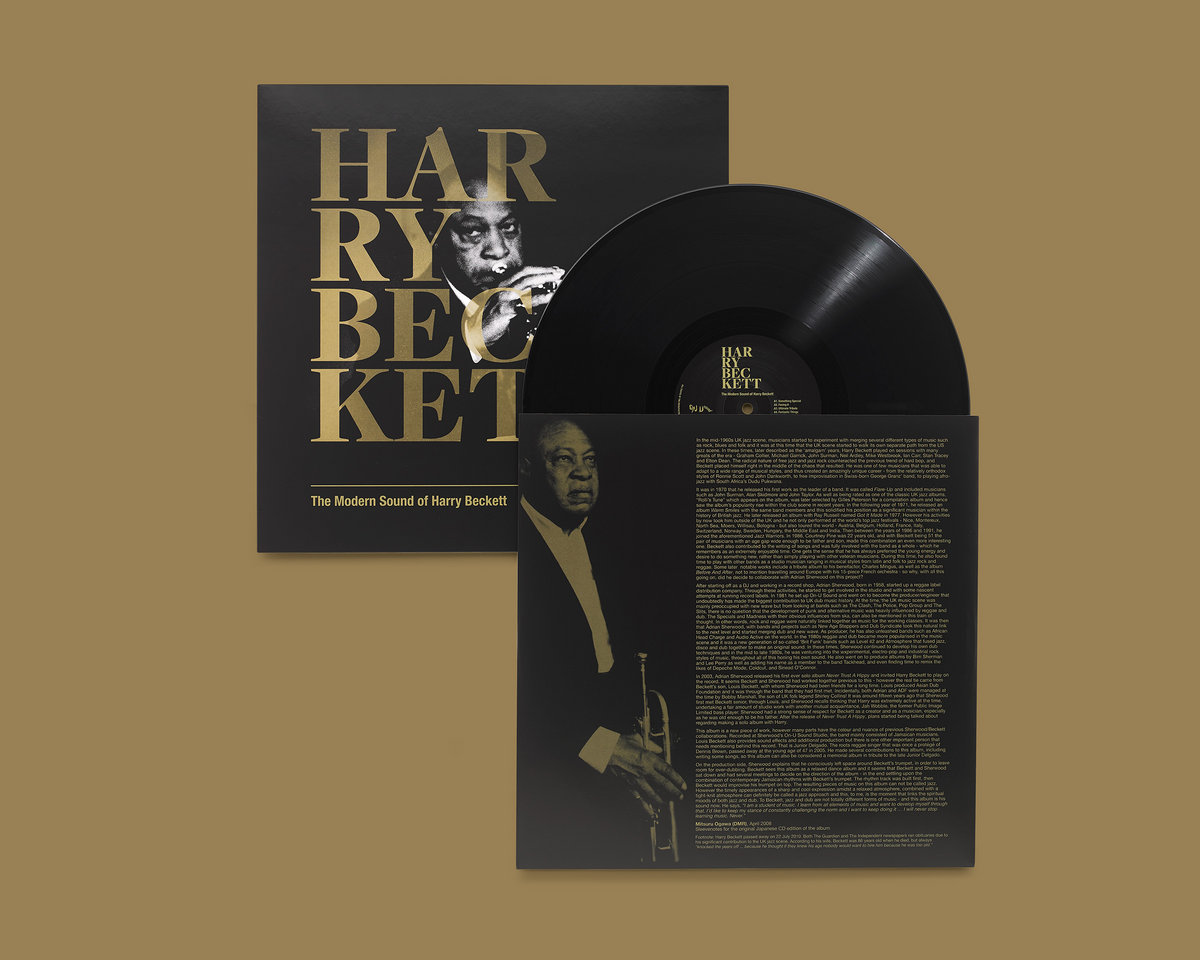 it’s a relatively straightforward jazz-dub affair, Headley’s sax interlaced with a rhythm section led by (the, again, now late) Style Scott of the Roots Radics. It’s a likeable outing, for sure, but Harry Beckett’s 2008 release benefits hugely from technological developments in the quarter of a century in-between. Beckett was a Barbadian trumpet player who was 73-years-old at the time of making the album. He had a storied career as a much-loved player in the British jazz scene, from the Sixties through to the Nineties. His On-U set combines fluid jazz chops with classic boomin' Sherwood bass architecture, featuring Skip McDonald on guitar and a vocal from Junior Delgado. It's a zinger. Both albums come with inner sleeves containing photos and further info.
it’s a relatively straightforward jazz-dub affair, Headley’s sax interlaced with a rhythm section led by (the, again, now late) Style Scott of the Roots Radics. It’s a likeable outing, for sure, but Harry Beckett’s 2008 release benefits hugely from technological developments in the quarter of a century in-between. Beckett was a Barbadian trumpet player who was 73-years-old at the time of making the album. He had a storied career as a much-loved player in the British jazz scene, from the Sixties through to the Nineties. His On-U set combines fluid jazz chops with classic boomin' Sherwood bass architecture, featuring Skip McDonald on guitar and a vocal from Junior Delgado. It's a zinger. Both albums come with inner sleeves containing photos and further info.
Bobby (Boris) Pickett and the Crypt-Kickers The Original Monster Mash (Decca)
 I once DJed at a Halloween party where they asked I play Halloween music but emphatically not “Monster Mash”. Shame. “Monster Mash” is one of the only persistently A-list novelty songs of which I’ve never tired. Nonetheless, I do understand that its ubiquity, particularly in the United States, might be an irritant. For those that do want more but not THAT song again, Decca are reissuing the 1962 parent album. Filled with numbers such as “Sinister Stomp”, “Transylvania Twist”, “Blood Bank Blues”, “Graveyard Shift” – you get the picture – the music is imitation Phil Spector-esque girl-pop and stylistic pastiches of contemporaneous dance craze hits (“The Twist”, etc). I have a soft spot for the late Bobby (Boris) Pickett, who parlayed one jolly piece of Halloween fluff into a lifelong career. Good for him. The album is a hoot, a snapshot of pre-Beatles America having innocent fun. Comes on transparent vinyl.
I once DJed at a Halloween party where they asked I play Halloween music but emphatically not “Monster Mash”. Shame. “Monster Mash” is one of the only persistently A-list novelty songs of which I’ve never tired. Nonetheless, I do understand that its ubiquity, particularly in the United States, might be an irritant. For those that do want more but not THAT song again, Decca are reissuing the 1962 parent album. Filled with numbers such as “Sinister Stomp”, “Transylvania Twist”, “Blood Bank Blues”, “Graveyard Shift” – you get the picture – the music is imitation Phil Spector-esque girl-pop and stylistic pastiches of contemporaneous dance craze hits (“The Twist”, etc). I have a soft spot for the late Bobby (Boris) Pickett, who parlayed one jolly piece of Halloween fluff into a lifelong career. Good for him. The album is a hoot, a snapshot of pre-Beatles America having innocent fun. Comes on transparent vinyl.
Catpack Catpack (Tru Thoughts)
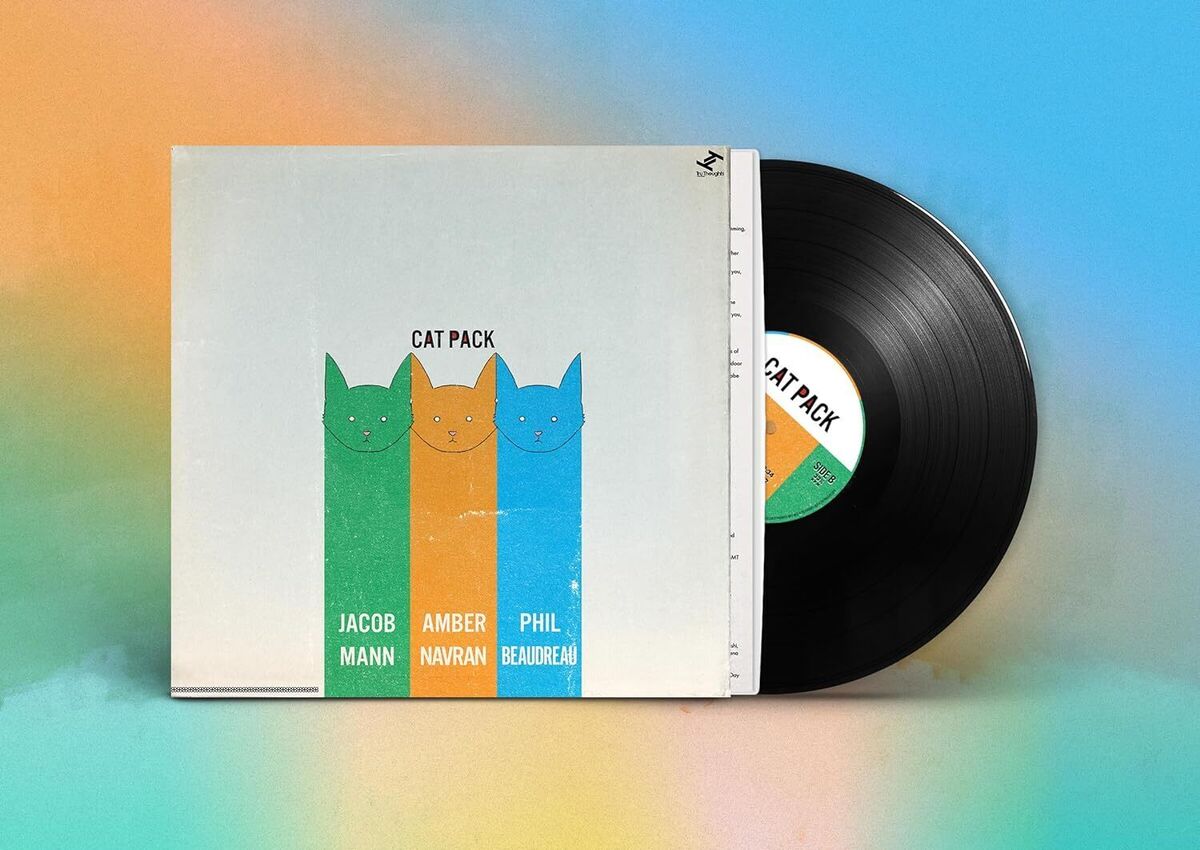 I am not keen on Los Angeles alt-R&B merchants Moonchild but their lead singer, Amber Navran, here gets together with Jacob Mann and Phil Beaudreau for a new project. Mann is a multi-instrumentalist and bandleader in his own right, and Beaudreau is a successful producer who’s worked with Dr Dre, Justin Bieber, The Game and many more. Together the trio create woozy, super-mellow, mildly psychedelic vocal jazz that sounds like sonic smoke. Imagine you’ve imbibed slightly too many edibles, it’s 4.00 AM on the sofa, and someone is whispering sweet nothings while syrup-dripping blobs of electronic jazz massage into your ears, the whole thing taking place in a gloopy subterranean dusk. It’s kind of like that. Comes in art/lyric inner sleeve.
I am not keen on Los Angeles alt-R&B merchants Moonchild but their lead singer, Amber Navran, here gets together with Jacob Mann and Phil Beaudreau for a new project. Mann is a multi-instrumentalist and bandleader in his own right, and Beaudreau is a successful producer who’s worked with Dr Dre, Justin Bieber, The Game and many more. Together the trio create woozy, super-mellow, mildly psychedelic vocal jazz that sounds like sonic smoke. Imagine you’ve imbibed slightly too many edibles, it’s 4.00 AM on the sofa, and someone is whispering sweet nothings while syrup-dripping blobs of electronic jazz massage into your ears, the whole thing taking place in a gloopy subterranean dusk. It’s kind of like that. Comes in art/lyric inner sleeve.
Meridian Brothers Mi Latinoamérica Sufre (Ansonia/Bongo Joe) + Forest Law Zero (Bongo Joe/Total Refreshment Centre)
 Two records from theartsdesk on Vinyl-rated Swiss label Bongo Joe. Colombian musician Eblis Álvarez has produced multiple albums by various units he’s led, all called Meridian Brothers. His music ranges from attempts at pop to deranged sonic odysseys. Mi Latinoamérica Sufre is neither, though, perhaps, closer to the latter. It is, says the press release, a concept album that “seeks to explore the untapped potential of electric guitar in a tropical Latin context”, but there’s also a 12” x 12” insert which explains it’s “the tale of Junior Maximiliano the Third, a peculiar character navigating the perplexing recesses of self-discovery”. When the needle hits the record, what bubbles from the speakers is exotica-flavoured abstract lounge-funk peppered with queasy flecks of attempted African jit guitar. Like much of
Two records from theartsdesk on Vinyl-rated Swiss label Bongo Joe. Colombian musician Eblis Álvarez has produced multiple albums by various units he’s led, all called Meridian Brothers. His music ranges from attempts at pop to deranged sonic odysseys. Mi Latinoamérica Sufre is neither, though, perhaps, closer to the latter. It is, says the press release, a concept album that “seeks to explore the untapped potential of electric guitar in a tropical Latin context”, but there’s also a 12” x 12” insert which explains it’s “the tale of Junior Maximiliano the Third, a peculiar character navigating the perplexing recesses of self-discovery”. When the needle hits the record, what bubbles from the speakers is exotica-flavoured abstract lounge-funk peppered with queasy flecks of attempted African jit guitar. Like much of  Meridian Brothers’ oeuvre, it’s an unlikely success, approachably bouncy and with actual tunes, despite its oddness. Alexander Burke, AKA Forest Law, is based in prosaic old Romford, Essex, but he recorded his debut album in Portugal and Iceland. It sounds like none of those places. Well, maybe a little like Portugal. If a cook took ingredients that included tropicalia, weird old Rephlex electro-pop, funky jams The Egg made in the late 1990s, Japanese choral exotica, and up-its-own-cappuccino-sipping-arse broken beats, then the result might end up something like Zero. It ranges from the truly funky to the jazz-pretentious but it’s never boring.
Meridian Brothers’ oeuvre, it’s an unlikely success, approachably bouncy and with actual tunes, despite its oddness. Alexander Burke, AKA Forest Law, is based in prosaic old Romford, Essex, but he recorded his debut album in Portugal and Iceland. It sounds like none of those places. Well, maybe a little like Portugal. If a cook took ingredients that included tropicalia, weird old Rephlex electro-pop, funky jams The Egg made in the late 1990s, Japanese choral exotica, and up-its-own-cappuccino-sipping-arse broken beats, then the result might end up something like Zero. It ranges from the truly funky to the jazz-pretentious but it’s never boring.
Arsenal Mikebe Drum Machine (Nyege Nyege Tapes) + Seefeel Everything² (Warp)
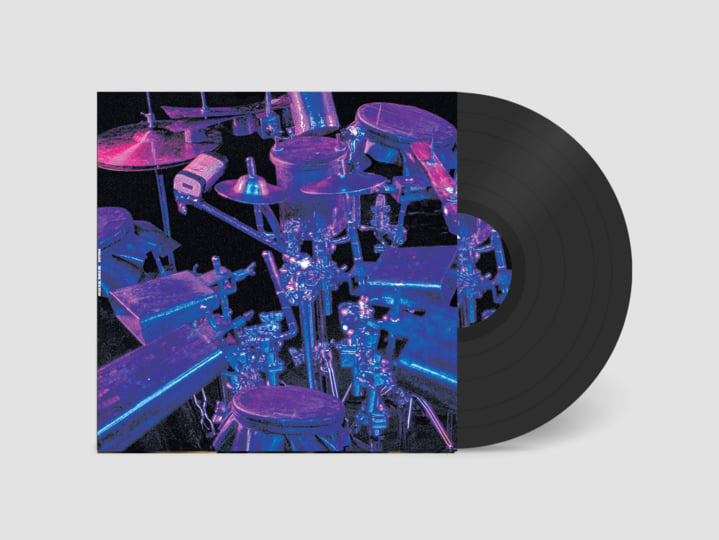 Two albums that combine, in different techno-centric ways, the organic and the electronic. Based in Kampala, Uganda, Arsenal Mikebe are Jonathan Uliel Saldanha, Ssentongo Moses, Dratele Epiphany and Luyambi Vincent de Paul who, between them, combine synths, drums and a “reverse engineered” Roland TR-808 to create percussive music that is, in essence, techno, but underpinned by an African feel, more explicitly on the chant-laden “Bell Ghost”. The six tracks are harsh and dry yet dancey. I’d like to see them play in the middle of the night at fabric or some graffiti’d Berlin den. Seefeel were one of Warp Records’ original 1990s post-rock signings, an outfit who saw potential in nudging the trad band unit into a then-popular style preposterously known as “intelligent dance music”. This simply meant electronic music whose purpose might be defined by
Two albums that combine, in different techno-centric ways, the organic and the electronic. Based in Kampala, Uganda, Arsenal Mikebe are Jonathan Uliel Saldanha, Ssentongo Moses, Dratele Epiphany and Luyambi Vincent de Paul who, between them, combine synths, drums and a “reverse engineered” Roland TR-808 to create percussive music that is, in essence, techno, but underpinned by an African feel, more explicitly on the chant-laden “Bell Ghost”. The six tracks are harsh and dry yet dancey. I’d like to see them play in the middle of the night at fabric or some graffiti’d Berlin den. Seefeel were one of Warp Records’ original 1990s post-rock signings, an outfit who saw potential in nudging the trad band unit into a then-popular style preposterously known as “intelligent dance music”. This simply meant electronic music whose purpose might be defined by 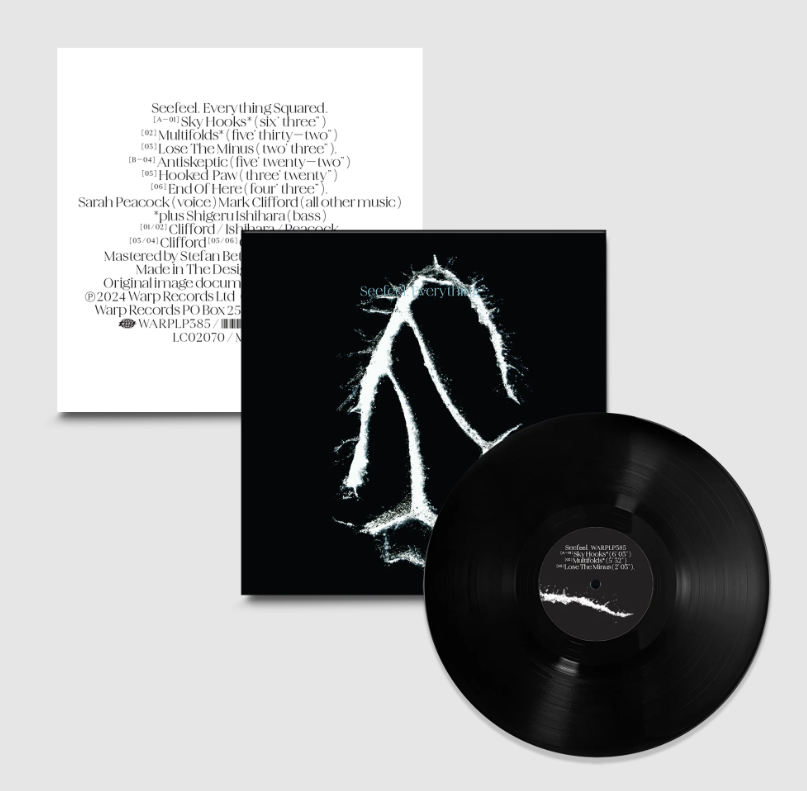 exploration and avant-garde-ism rather than simply making people dance or “chill”. But that last sentence is a mouthful, isn’t it, so we were lumbered with “IDM” and a bunch of (almost solely) blokes wearing black who were more interested in trainspotting limited edition Monolake remixes than having any fun. Then again, I suppose it might have been fun for them. But I digress. Since Seefeel reappeared, after an eight-year break, in 2008, they’ve hardly settled to Nineties nostalgia. Quite the opposite. Their new mini-album is a case in point. Mastered by Pole’s Stefan Betke – which is of import as Betke does things with bass frequencies that few can – the four-piece create six pieces wherein, above a landscape of bass murk and occasional thunderous beats, sweet child-like singing voices, treble frequencies and frazzled scratchings float untethered. The result has a sort of horror filmic quality but is also sometimes darkly beautiful.
exploration and avant-garde-ism rather than simply making people dance or “chill”. But that last sentence is a mouthful, isn’t it, so we were lumbered with “IDM” and a bunch of (almost solely) blokes wearing black who were more interested in trainspotting limited edition Monolake remixes than having any fun. Then again, I suppose it might have been fun for them. But I digress. Since Seefeel reappeared, after an eight-year break, in 2008, they’ve hardly settled to Nineties nostalgia. Quite the opposite. Their new mini-album is a case in point. Mastered by Pole’s Stefan Betke – which is of import as Betke does things with bass frequencies that few can – the four-piece create six pieces wherein, above a landscape of bass murk and occasional thunderous beats, sweet child-like singing voices, treble frequencies and frazzled scratchings float untethered. The result has a sort of horror filmic quality but is also sometimes darkly beautiful.
ALSO WORTHY OF MENTION
Creeping Jean Business is Dead (Creeping Jean): I came across Creeping Jean’s debut album a couple of years ago when it was handed to me by one of the band in the Brighton clothes boutique Mammoth Vintage. This shop now appears in the cover art of their second album (as left), and the band now have a press person. Progress! Whatever, their latest expands their sound beyond the straightforward retro rock of debut When’s the Blowout? It’s still retro Seventies-touched guitar fare but now there’s a tad more groove going on, and their sound has filled out, flickers of synth and occasional strings. I’d imagine live in concert is where they’re best. Album arrives on azure vinyl.
Ishmael Ensemble Rituals (Severn Songs): Bristol outfit Ishmael Ensemble have established themselves as jazz-adjacent rather than jazz, in the same way that bands such as, in their very different ways, Portico Quartet and Massive Attack, (Ishmael Ensemble sound like neither). Their third album moves even further towards song structure than its predecessors, albeit based in electronically enhanced genre leanings. From the 4/4 house song “Fever Dream “ to the cloudy shoegaze of “Cold Light”, they sound like a band ready to cross over into the universe of Tame Impala and Arcade Fire, alt-pop from a place outside the usual. Comes in lyric gatefold on transparent bright yellow vinyl.
Ultravox Lament (Chrysalis) + Depeche Mode Spirit | The 12” Singles (Mute/Columbia): Proggy synth-pop stars Ultravox were still holding firm, commercially, in 1984 when Lament came out, although none of their albums matched the success of 1980’s Midge Ure-fronted debut, Vienna. The reissue, which arrives in gatefold and slip case, showcases the catchy No.3 hit, “Dancing with Tears in my Eyes”, their second-biggest hit, as well as the singles “One Day” and the title track. The rest is industrial-tinted electro-gloom-rock although tracks such as “A Man of Two Worlds” contain interest. Where Ultravox are long gone, excepting a five-year comeback around a decade ago, Depeche Mode are still very much with us, albeit, with the death of Andy Fletcher in 2022, now in the form of the band’s two creative leads Dave Gahan and Martin Gore. Their boxset collections of each album’s 12” singles is slowly heading towards the present with a seven record set relating to 2017’s Spirit, the album before last year’s Memento Mori. Spirit saw Depeche Mode returning to the political themes and anger of “Everything Counts”. The boxset consists of multitudes of remixes of the singles “Where’s the Revolution”, “Going Backwards” and “Cover Me”, as well as a Soulsavers “rework” of “Poison Heart”, a Latroit remix of “You Move” and the Kalli remix of “So Much Love”. Of the nine versions of “Where’s the Revolution”, which include mixes by Simian Mobile Disco, Autolux and Terence Fixmer, theartsdesk on Vinyl’s choices are Patrice Bäumel’s twinkling pop-prog-house take and Ewan Pearson’s throbbing Kompromat Dub, unless you want it caustic and noisy, in which case turn to Algiers' version. For “Going Backwards”, which has mixes by Point Point and Belleville Three, I’m heading for Chris Liebing’s Burn Slow deconstruction and, for the dancefloor, the ever-reliable Solomun. Finally, for “Cover Me”, which has seven versions, including ones by Nicole Moudaber, Warpaint and Erol Alkan, I especially like Ellen Allien’s urgent electro-house mix and a the spacey cover by US singer Josh T Pearson. The seventh disc contains live-in-studio cuts recorded by the band at the end of the studio recordings, Highline Sessions, which include previously unreleased versions “So Much Love” and “A Poison Heart”, and a cover of Bowie’s “Heroes”. The standard throughout is high.
Apollo Ray In Orbit (Garmonbozia) + def.fo Music for Dinosaurs (Def.Fo): Two new albums that represent artists on driven solo missions creating crafted downtempo pop. Apollo Ray is Londoner Louis Pavlo whose day job is as a working musician, often travelling the globe with Elvis Costello’s touring units. His own debut album is a chilled bedroom pop lie-in, tuneful and soft-touched with musical whimsy. Time has been spent on it which pays off, its melodic musical layers, reverb-misted, and coming on like long-lost old TV themes, fused with a sound somewhere between Eyes of Others and Holland-era Beach Boys. Comes in lyric/info inner sleeve. Liverpool producer Tom Powell records as def.fo. On his impressive debut Eternity there were strong late-Sixties-flavours and the follow-up has hot knife-friendly guitar freakin' but is bedded into loping, heavy duty breaks, of the Massive Attack Blue Lines variety. This isn’t soul or trip hop, though, as def.fo is more interested in taking us into a head-nodding stoner journey of alt-pop songs, whispered, rapped and sung. It’s music that, like its loud cover, cartoon inner sleeve and bright apple green vinyl, draws the attention. Comes with a couple of stickers.
Aron & The Jeri Jeri Band Dama Bëgga Ñibi (SAS Urban Trout) + Amadou & Mariam La Vie Est Belle: Best Of (Because) + África Negra Antologia Vol. 2 (Bongo Joe)
Two from Africa and one with an African back story. The latter first. Aron Ottignon is a New Zealander based in Berlin. He has worked extensively with stars-in-France Stromae and Woodkid, and released a jazz album on Blue Note. His latest album, however, was engendered by how his German studio became a haven for Senegalese musicians stranded in the country by the pandemic. It has guest appearances by Baaba Maal and others and is very mixed in flavour, from the rolling percussive title track, to various electro-laced bangers, to the relatively straight Afro-pop of “Mama Djuma”. A solid listen... with outbreaks of dancing. Comes with lyric/info inner sleeve. Malian "Afro-blues" duo Amadou & Mariam have maintained success for two decades now, especially in French-speaking nations. Their latest Best Of compilation well captures their appeal, a snapshot of these 20 years. Their music isn’t so much blues as African-stewed pop-rock. Right from the opening “Sabali”, which you’ll know, even if you think you don’t, due to its use on TV and film, the whole set boasts an ebullient catchiness. Featuring Santigold, TV On The Radio and others, it’s spread over four sides of vinyl, replete with 12” x 12” four page poster/info booklet. Funky, tuneful and full of a Western pop hookiness, it’s a compilation that makes what used to be called “world music” about as accessible as it's possible to be. Meanwhile Bongo Joe Records – them again – have been digging down into music from the African island nation of São Tomé and Príncipe. Specifially, the two record Antologia Vol. 2 offers a fresh selection of unearthed tracks by África Negra, dating from 1979 to 1990. The band were in-demand star performers in West Africa at the time and it’s easy to hear why. Their music is energized, dipped in the local puxa dance style, spray-painted with jubilant soukous guitars, the rhythms revolving sweetly in a manner that should propel anyone alive to shake what God gave them. Comes in photo gatefold containing photos and an extensive history of the band.
Juno Reactor Labyrinth (Demon) + Ken Ishii Reference to Difference (Sublime) + Susumu Yokota Acid Mt. Fuji (Sublime) + La Fleur Väsen (PIAS Electronique)
Talking of club-related sounds, three reissues and a new album also take us there. First off, Juno Reactor, a band who, at their best, combined percussive global styles with psychedelic trance music. They made a mint placing their tunes in films and games, notably the second and third Matrix films, from which 2004’s Labyrinth contains “Navras” and “Mona Lisa Overdrive”. I’d argue that Juno Reactor peaked with 1997’s Bible of Dreams, an exciting and oft-forgotten slice of 1990s dance music that contains their most famous tune, "Conga Fury", but Labyrinth has its moments. It’s gothier than previous fare, recalling lead Reactor bod Ben Watkins 1980s work with proto-techno outfit The Flowerpot Men. On manic shouty zingers such as “Zwara”, this is a good thing. Comes as a double set. Next, reissues of two albums released on the same day in summer 1994, both available on vinyl for the first time, and both showcasing Japan’s early and deep affiliation with techno on a label that led the way, Sublime. Ken Ishii became a big name in 1990s techno, a DJ-producer who embraced Detroit sounds early and eventually became associated with Richie Hawtin and Plus 8 Records. Reference to Difference is a sedate affair, not a million miles from the quieter cuts on Plastikman’s Sheet One debut, but innately scaled to Japanese tones. Taking a different route, the 1994 debut album from the Susumu Yokota, who died in 2015, is a gently head-frying trip through a technoscape within which, it seems, wildlife lives on the peripheries, while at the centre pulses bubble, repeat and quirk amid the minimalism. It’s curiously more-ish and the new vinyl edition includes five unreleased tracks. Finally, bringing things up-to-date, Swedish DJ-producer La Fleur’s latest album throbs with an elegantly paced house-meets-techno chug. Some cuts, such as the title track, emanate bass-boosted urgency, but many swing by pleasant yet not consciously heard. Comes on British racing green vinyl in fern-laden inner sleeve.
Lady Blackbird Slang Spirituals (BMG) + Jimetta Rose & the Voices of Creation Things Are Getting Better (Day Dreamer): Two records that arrive from modern perspectives on gospel and soul flavours. Lady Blackbird has been called “the Grace Jones of jazz”, mostly due to her striking costumes and stage presentation. Her second album rolls along on gospel-rock grooves which bring to mind Dusty in Memphis fused with Moby’s Play and whole hot dose of Aretha Franklin. Opener “Let Not (Your Heart be Troubled)” sets out the table, a whopper, redolent of Exile on Main Street, but the album, as a whole has many flavours. Comes on transparent vinyl on photo/lyric gatefold. By its very nature, as an Afro-American-centric choir, the second album from Jimetta Rose & the Voices of Creation sounds even more gospel. Los Angeles singer Jimetta Rose had album releases and a music career before putting together the community choir Voices of Creation, but she seems to have now found her creative happy place. Their sound is, of course, led by choral voices but is as much laced with funk and even hip hop. It’s a large sound that encourages body movement as much as it does listening. One could imagine them at WOMAD with a field of dancing bodies before them. Comes with a triple-fold photo/info 12” x 12” insert wherein each member explains what Voices of Creation means to them.
Hank Mobley Workout (Blue Note) + Mari Kvien Brunvoll & Stein Urheim with Moskus (Anja Lauvdal, Fredrick Lurh Diterichson, Hans Hulbækmo) Barefoot in Bryophyte (HUBRO): Jazz old and new. In his twenties, throughout the 1950s, saxophonist Hank Mobley was a regular on the New York jazz scene working with all sorts, from Duke Ellington and Dizzy Gillespie to Donald Byrd and Milt Jackson. He was also, at times, a member of The Jazz Messengers. His 1960s were troubled by heroin addiction, including a prison sentence, but he effectively led his own band on a number of Blue Note albums, including 1961’s Workout, a guitar/sax/piano/drums set-up which sees him flying with bebop ease on long flowing pieces such as “Smokin’” and the title track. Mari Kvien Brunvoll & Stein Urheim with Moskus (Anja Lauvdal, Fredrick Lurh Diterichson, Hans Hulbækmo) are a catchily titled unit, aiming for an easy Google. Such facetiousness aside, what the Norwegian jazz collective create derives from jazz but isn’t really jazz. Mingling electronics with zither, flute, piano, harmonium, bass, cello, recorder, and much percussion, as well as folky vocals, they make cute music that defies definition. Opener “Nils Klim” is as catchy a piece of instrumental Mike Sammes-style lounge-pop as you’ll hear this year, but elsewhere are blurry, droned-out cuts such as “Colors”. One thing is for sure, the ears never lose interest.
Willie Colón The Big Break/La Gran Fuga (Fania/Craft) + Celia & Johnny Celia & Johnny (Vaya/Craft): Two Seventies Latin music juggernauts. New York salsa behemoth Fania Records celebrate their 60th birthday this year with a mass of rereleases including these two (Vaya is a sub-label). Trombonist and activist Willie Colón hit an early career peak in 1970 with The Big Break/La Gran Fuga. It was created with a fellow Puerto Rican-American, the singer Héctor Lavoe, and the pair, backed by a suitable array of bongos, congas et al, create as jolly a Hispanic gumbo of sunshine dancefloor sounds as anyone could ask for. Contains tunes such as “Ghana’E” and “Barrunto”, and comes with a poster that expands on the “WANTED – Armed with a trombone and considered dangerous” cover art. The latter is amusing in light of Colón’s later professional involvement with law enforcement. Celia Cruz, “queen of salsa”, was a Latin music superstar but, banned from her native Cuba for criticising Castro, she had to reinvent her career Stateside, which she did with aplomb. A key part in this journey was her involvement with Fania from 1973. A year later, when she was almost 50, she hit a career peak with Celia & Johnny, recorded with Fania founder-producer-composer Johnny Pacheco. The record has since been cited to America’s National Recording Registry as of huge import by the Library of Congress. Such cultural-historical hype aside, in photo gatefold, it’s a glorious salsa sensation, sometimes laidback, very much usually not, which sees both parties involved shine bright. A joy.
Various Eddie Piller presents The Mod Top 40 (Demon) + Various The R&B Scene (Decca): Acid Jazz man Eddie Piller seems to spend most of his time these days curating albums telling the world what mod is or was, whether that’s Seventies new wave bands in cheap sharp suits or psyched Sixties longhairs who took black bombers before moving onto Owsley acid. Can’t fault him, though, his selections are on-point. Mod Top 40 is a tribute to the late Randy Cozens, a mod music lover who, at the end of the 1970s, persuaded now-defunct music mag Sounds to feature his guide to the key tunes that were played at London mod all-nighters in the 1960s. Eddie Piller draws from Cozens’ Top 100, throws in a few of his own choices, over four sides of vinyl in info inner sleeves filed with pics and background. The result is an exuberant collection of R&B-boosted soul from the likes of Ike & Tina Turner, James Brown, Doris Troy, Solomon Burke and a whole host of long-forgotten acts. It’s a treat. As is Decca’s The R&B Scene. Most of the acts on here, UK rhythm’n’blues aficionados, would have been down those same clubs, sponging up sounds from the States, although what’s on this double set attempts a raunchier US roadhouse guitar sound, via the feel of drizzle-basted, wonk-toothed coffee shops in British cities. The Rolling Stones – not present – were the ones who eventually made it but this set speaks to a whole lively sweaty scene where bands such as The Birds, The Graham Bond Organization, Alexis Korner’s Blues Incorporated and Zoot Money (all present) held court, and which would birth actual stars such as Lulu and Rod Stewart (also both present). It has an unfiltered energy that would later take over western popular music and be known as ROCK. Double on white vinyl.
Jah Thomas The Music Maker From Jamaica: Best Of (Midnight Rock/Acid Jazz): Fans of classic late Seventies Jamaican DJ-dancehall will undoubtedly know Jah Thomas, AKA Nkrumah Manley Thomas (most of these cuts date from the 1980s but the sound hails from the previous decade). I confess this is the first time I’ve consciously crossed paths with him, but this collection is a pleasure. These dancefloor hits of that era were almost all recorded with Roots Radics at Channel One Studios, then mixed down with King Tubby. Those facts alone suggest the solid skank within the grooves, as Jah Thomas gets busy on the mic. The tunes date from between 1976 and 1983. They can be quite samey but dipping in and out is a blast.
Sam Redmore Modulate (Sam Redmore): Brummie DJ-composer-arranger-bandleader Sam Redmore makes a quantum leap forward with his second album, which boasts an easy confidence in its often Latin-touched grooves, slinky rhythms and high-spirited songwriting. He has drawn together a tasty band of players and features a host of guests who add spice to individual tracks, such as Dele Sosimi, Abdominal and Lumi HD. Blazing with upbeat brass, ranging across disco, soul and Afro sounds, with bright clarity in the production and depth in the mastering, this one packs full-festival-dancefloor wallop.
Afterimage Faces to Hide (Independent Project) + The Jesus Lizard Rack (Ipecac): A couple of old US punk outfits, one with a collection of their work from back in the day, the other with a new album after being disbanded for years. Afterimage were a Los Angeles band that existed at the dawn of the Eighties. Their tastes ran to Magazine, Gang of Four and the like and their music, replete with sax, has the enjoyable spaciousness and lumpy Luddite funk of the best post-punk. It’s well worth a dip. Faces to Hide collects all their releases over its two records, alongside demos and live tracks, an eight-page booklet and Independent Project’s usual letterbox packaging. They have been likened to Joy Division and do occasionally sound that way but it’s more redolent of feisty Adolescent Sex-era Japan. The Jesus Lizard have one of the best names in rock’n’roll. The Texan outfit have now begun their third incarnation and make their first reappearance in 17 years with Rack, their gnarl-rock teeth still sharp. This could be an album by a fresh young band of noisies. They sound invigorated. Arrives in lyric inner sleeve.
MOMO Gira (Batov): Spread over four sides of plastic, the seventh album from London-based Brazilian Marcelo Frota, AKA MOMO, balances jazz chops with a loose-limbed funkiness drawn directly from his heritage. The album is played live and built round the talents of players such as Alabaster DePlume (sax) and a righteous rhythm section (drummer Nick Woodmansey of jazzers Emanative, percussionist Magnus Mehta of Afro-tronic unit Penya, and Brazilian bassist Caetano Malta), as well as featured singers on some cuts. Gira take its time and pleasures lie in prolonged exposure, the live jams hitting their grooves and slowly sweeping up those willing.
Beak> >>>> (Invada): Geoff Barrow is one of the few who’s made it in popular music and admirably doesn’t give a hoot about all the usual stuff. He could have turned his band Portishead into a globetrotting money-hoovering unit but wasn’t interested. We could all learn from him. If you have enough money to lead a decent, happy life, lead it, and stop trying to make more and more money. But, to the point in hand, his latest album with his trio Beak> seems to have been done on a whim after lots of live shows. Where their presentation is usually po-faced, graphics-led minimalism, >>>> features Barrow’s late dog on the front, rendered huge and zapping the band with eye-lasers, in cheesily rendered PhotoShop. The album itself consists of eight tracks tinted with Seventies psychedelic prog, but in an interesting manner, mucking about with synths and rhythms in a way no-one would have done back then (except maybe Arthur Brown’s Kingdon Come). Ranging from the bubbly to the doomy, it won’t reanimate Barrow’s profile. In fact, most won’t even notice it and Beak> can carry on trawling around the gig and festival circuit. I’d imagine that’s just the way Geoff Barrow likes it. Comes on transparent vinyl.
Ike Noble & the Uptights Money Won’t Change You (Athens of the North) + Ike Noble & the Uptights Good Thing (Athens of the North) + Premonition Here in the Name of Love (Athens of the North) + Lee Tracy Is It What You Want (Athens of the North) + Coast To Coast Paula Marie (Athens of the North): Athens of the North is Euan Fryer’s Edinburgh label which specialises in repressing ultra-lost soul and funk deep cuts. The batch of 7”s they’ve sent theartsdesk on Vinyl include the James Brown-induced dancefloor zip of Sixties Memphis outfit Ike Noble & the Uptights (plus flipside brassy soul such as “Look a Little Higher”); Seventies New York act Premonition’s functionally lively disco; the fascinating lo-fi synth-soul of Lee Tracy, with his pal Isaac Manning, the pair turning their complete lack of resources into an otherworldly positive on 1980s home recordings; and New York late-Seventies band Coast to Coast dabbling in Northern Soul and disco. A tasty selection but my faves are the weird under-produced edge of Lee Tracy and the sax-crazed attack of Ike Noble & the Uptight’s take on James Brown's "Money Won't Change You".
AND WHILE WE’RE HERE…
- Thee Marloes come from Indonesia but listening to their debut album, you’d often not know this (well...aside from a smattering of songs in their own language!). Perak, which appears on Brooklyn soul-jazz-funk fanatics Big Crown Records, sees the trio, fronted by the silky voice of female singer Natassya Sianturi, laying down 12 numbers of bedroom late night sexy retro soul. They've totally nailed the sound they’re going for.
- On light transparent pink vinyl, in lyric inner sleeve, comes the debut album from London singer-songwriter Hattie Whitehead. Entitled Bloom it’s straightforward gently band-backed stuff, not doing anything new but emotionally engaged, well-voiced, and decently written (check “Valentine”).
- Paul Williams has been around the block many, many times and, undoubtedly, has the stories to back that up. He’s worked with everyone from The Muppets to Daft Punk, as well as writing for numerous well-loved films (the songs from Bugsy Malone!). At the dawn of the Seventies, when everyone from The Carpenters to Kris Kristofferson was lining up to work with him, he had a parallel solo career that never really took off. His third album, 1971’s Just an Old Fashioned Love Song, now reappears, its title song a hit back then for Three Dog Night, alongside a Best Of… collection, both on Universal, and both containing songs often laced with syrup, but catchy. Pitched midway between musical theatre and pop/rock, it’s easy to hear why his career took the path it did. Just an Old Fashioned Love Song comes in die-cut cover with a 16-page 12” x 12” lyric booklet.
- Chris Bangs is a behind-the-scenes operator who’s primarily initial renown derived from his helming Acid Jazz records (and movement), which led to involvement with Paul Weller, Brand New Heavies and many more. These days he’s as likely to be found helming his own studio band on a series of bouncy instrumental albums. The latest, Dream World on Acid Jazz, consists of jolly Latin-flavoured funky jams. One could imagine it keeping the mood up in a hip and lively London restaurant where they sell as many cocktails as dishes.
- 1980s indie icons, Cocteau Twins, who made the word “ethereal” a staple of music journalists for over a decade, and American composer Harold Budd, recorded an album together, released in 1986. Titled The Moon and the Melodies, it went out under their individual names in alphabetical order (Harold Budd. Elizabeth Fraser. Robin Guthrie. Simon Raymonde). As one might expect, it’s a set that mingles shimmering soundscapes with tunes that easily fit beside Cocteau Twins’ catalogue of that period. It’s on 4AD, of course, and remains a thoughtful exercise in ambient pop before such a thing really had a name. Comes in art inner sleeve.
- Pianist Espen Berg is a central figure in Norway’s thriving jazz scene. In 2016-17 he put together a piece for Trondheim Jazz Orchestra for a series of performances. This now appears as the Maetrix album on Odin Records, not the concert but a studio recording of music made in 2021. Spread over four sides of vinyl on photo/into gatefold, it has moments of late-night calm but is mostly palpitating with rhythm over which brass, strings, vibraphone and even the fluttering voice of Kirsti Huke make themselves felt. For Nordic jazzniks, it’s a feast.
- Bristol party DJ duo/band The Allergies can certainly raise the roof and show a crowd a good time, as theartsdesk’s Guy Oddy attests to here. They also pump out approximately an album year and have been doing so for yonks. The latest, on gatefold, is Freak the Speaker on Jalapeno Records. Their sound, an astute combination of hip hop, samples, and the very jolliest aspects of funk, does not press my buttons, but those that follow the band will likely enjoy as it’s very much bouncy business as usual.
- I’d never heard of the Edinburgh band Dominic Waxing Lyrical but they’ve been around a while. They seem to have been operating in the 1990s, then taken a break and returned about a decade ago. Prolific they’re not. Their new album, their fourth, is called Diminuet and is on Innis Orr Records. The songs are not conventional, consisting of sedately baroque, often string-accompanied pieces over which vocalist Dominic Harris abstract-poets in a forceful, sometimes quavering voice, like a weirdly grating folkie. I like its perversity. There may even be beauty in there somewhere if you stick with it. Comes on white vinyl with 12” x 12” lyric sheet.
- Californian musician Jerry Paper, on the other hand, is reasonably prolific. Inbetweezer is their tenth album in 12 years (Paper, real name Lucas Nathan, is non-binary and uses they/them pronouns). Arriving on pink-ink-in-water-coloured vinyl in lyric/info inner sleeve, the whole wrapped in an obi strip, the 10 songs are bedroom pop synth-laced bubblers, slightly stoned, that aim for a kooky charm and occasionally achieve that effect.
- Unsane and Cop Shoot Cop were both bands on the noisy New York scene that preceded grunge and was, in places (Helmet, Pussy Galore, etc), adjacent to it. In 2020 Chris Spencer from the former and Jim Coleman from the latter got together as Human Impact for an eponymous album. They clearly enjoyed it and are now back with a battering new set, Gone Dark, on Ipecac. It’s muddy gnarl-rock, splashed with bitter edges, and it makes no apologies.
- Mac Leaphart has been plugging away in and around Nashville for years but finally garnered a flash of attention for his Music City Joke album a couple of years ago. The follow-up, Motel Breakfast, on Leaphart’s eponymous label is a fine set of bar-bruised and boozy country, somewhere between Rolling Stones honkytonk and all those country-rock band that were huge in the mid-Seventies. Chatty, fatalistic, tuneful and zippy, it’s an appealingly seen-it-all sound that retains heart. Comes with 12” x 12” art/lyric insert.
- For the first time in vinyl in Britain, the 2010 debut album from Florida punks The Attack, Of Nostalgia and Rebellion, is hitting the shops, via a new label created by longstanding DIY Orlando print shop Enemy Ink. The Attack tour endlessly and their version of punk tips its hat strongly to British working class punks of the late 1970s, Angelic Upstarts and the like. As such it’s a pogo riot. Comes on maroon-brown vinyl splattered with white micro-comets, accompanied by a 12” x 12” photo/info insert.
- Californian label Independent Project are well-known for their unique packaging (“letterpress” is their style). Founded by Bruce Licher, once of Savage Republic, many of their releases may well be material by his mates, indie post-punk sorts in the local milieu, people he possibly has dinner and drink with; peers. Whether this is true or not, such feels like the case with Underwater Detection Method by Greg Lesher from Camper Van Beethoven, which is a collection of quirky, mostly ear-pleasing electronica-led noodles. They come over like incidental themes in search of a film.
- The eighth album from perma-touring Cork singer-songwriter John Blek is not an acoustic strummin’ affair. Entitled Cheer Up on Bigger River Records, it has moments that veer towards that but has an indie-rock heart laced with pop sensibilities, although it retains an intimate personal feel. Comes on transparent scarlet vinyl in a lyric inner sleeve.
- Those who like their electronica song-based, mellow and not obsessed with the clubland dancefloor may enjoy the third album from London electronic duo Tender. It’s called Flux and is on Stereo Sound Records. It balances a fuzzed-out spaciness with whispery crooner vocals; squidgy marijuana pop half-caught on a busted radio, like Bastille on hash cakes with the speaker submerged in treacle. Comes on fabulous vinyl that looks like an explosion in a florist.
- Those old enough may recall that an actor called Michael Praed was briefly a sex symbol as result of playing Robin of Sherwood on the BBC (later to be replaced by Sean Connery’s son Jason). I enjoyed it at the time and the music by Clannad too, a wispy electronic take on folk, of the type we’ve since become used to hearing in endless new age shops. Not sure I need a double album containing so much of it, entitled Legend on BMG, with a second disc of extra music not on the original 1984 package, but those after a rustic nostalgia time-trip might.
- Lush, the handmade cosmetics and spa treatments company, also has a record arm who occasionally release expectedly mellow fare. Their latest is a wafting Gaelic language affair designed to exude a sense of the Scottish Highland wilds. It’s called… Highlands and was created by a collective led by Julie Fowlis and the late Simon Emmerson, to whom the album is dedicated. It arrives on gatefold in art inner sleeve with art poster and 12” x 12” 12-page lyric/info booklet. Those few for whom the Clannad album reviewed above is not sufficient, may find something more here.
- Hiro Ama is the Japanese-born, London-based drummer for the band Teleman but his debut solo album on fleshy pink vinyl is a very different proposition. Music for Peace and Harmony on PRAH Records consists of serialist ambience with much flute and very occasional vocals, It fails to worm hard into the mind but is, nonetheless, not unpleasant, especially when then focus is on looping patterns, as on “Everything is Going to Make Sense in the End”.
- III is presumably the third album by shoegaze royalty “supergroup” HOO, which features members of Slowdive and Chapterhouse, amongst others. It arrives on creamy bright orange vinyl on Big Potato Records, mastered by New York supremo Heba Kadry, who’s worked with Beach House and Slowdive. The result is everything you’d expect; dreamy, phased-out, clangy guitars, and smudgy tunes. Comes with a woody and vaguely psychedelic 12” x 12” double-sided art print.
- James Alexander Bright is in the biz of producing woozy bedroom-pop funk that squelches by pleasantly, his voice airy amongst the groggy bubblin’. His latest is Cool Cool on Disco Records and it jollies on by like a bonged-out afternoon in an Amsterdam basement bar.
- Cephas Azariah is a British man of Indian heritage. The very long press release for his debut album, Joy Paradox on Reflections Records, suggests his “artistry and philosophy blend into one another, and instead of accolades, money and material possessions, he’d prefer to be at peace”. A solid principle. And the music is blurry modern-classical ambience, spread over four sides of vinyl. Put it on loud and its floaty, cloudal tones sound like the subconscious having an easy doze (NB. I know “cloudal” is not a word... but it is now).
- The reissued Steve Albini-produced (or “engineered”, as he might have it) 2004 third and final album by cult Welsh post-grunge-punk trio mcclusky veers between lo-fi cacophonics and more tuneful punkin’ cuts. The title, The Difference Between Me and You is That I’m Not on Fire, hints at the wry, dark humour lacing the lyrics. On Too Pure, it arrives on gatefold in lyric inner sleeve.
- Crass continue the 2 By 2 And Back Again series of 12” reissues of bands on their label with Rubella Ballet’s “Money Talks” from 1985 and The Cravats’ “Rub Me Out” from 1982. The former, female-fronted, have an early-Bauhaus gothy punch to their drum-propelled anarcho-power pop songs while the latter – who would go on to be more entertaining as The Very Things – offer up a rumbustious skronky, shouty jagged thing that recalls Eighties indie mavericks Stump. Likeably abrasive,. The latter comes enveloped in photo collage poster
- Those who enjoy Flamenco-style finger-picked guitar that couldn’t be more virtuosic, will want to hear the second album from Polish guitarist Marcin Patrzalek, who goes by his first name. On Sony Masterworks, it’s entitled Dragon in Harmony and arrives in photo/info gatefold and photo inner sleeve. Young and good looking, Marcin came up through various global TV talent shows. His music is a slick combination of his skills with catchy pop production and the album contains covers of Nirvana, Sade and Justin Timberlake. It’s more enjoyable than it should be.
- I’ve often thought that the world needs more songs about plants. No, I really have. Scottish singer and fiddler Kate Young would agree and has, accordingly, taken action. Her new album, Umbelliferae on Meaw Records, is a double that combines proggy folk with a set of likeable songs about plants of Britain. It’s a rich and varied outing that sustains its unlikely journey. Comes in a lovely Victorian decoupage-style cover and art/lyric inner sleeves.
- Johnny Foreigner are an old school indie guitar band from Birmingham who existed for the around a decade during the landfill indie era of the ‘00s and teens and have now reformed. They never made it back then, possibly because their sound harks back too much to the ramshackle indie of the ‘80s and a certain punkoid messiness. This is a good think. Most of the ones that did make it back then were dreadful. Johnny Foreigner return with How To Be Hopeful on Alcopop! Records and maintain their dishevelled jauntiness. Comes on art gatefold double with 12” x 12” lyric sheet on vinyl that’s a pleasingly smudged teal
- A Californian relocated to Scotland, Alas de Liona fires out her second album Gravity of Gold on Deli Owner Records. It is less folky and more pop-rock tinted than her 2017 debut. She has a swooping good voice and the production by Idlewild’s Rod Jones brings out the best in her well-crafted alt-pop songs. Comes with 12” x 12” lyric insert on liquid-ish grey vinyl the visual texture of, er, garlic purée.
- I would guess it’s a good life being Eli & Fur, a London duo in their twenties who make electronic music that bridges house and trancey beach-MDMA pop. Crucially, in terms of the financials, they also DJ around the world. Their fourth album is a double in lyric gatefold on white vinyl called Dreamscapes on PIAS that places their vocals over pulsing eyes-closed-hands-in-air tuneage.
- Weirdly, the songwriting of Californian sibling unit L.A. Edwards is not so distant from Eli & Fur, above. Their latest album, Pie Town on Bitchin’ Music and on white vinyl, contains that same kind of mainstream heart-on-sleeve longing that induces euphoria in some. But, where Eli & Fur bolt their songcraft to a smooth 4/4 dancefloor pulse and synths, L.A. Edwards is more in the line of, say, recent Josh Ritter, lead guitar ensconced in hazed synths and mirage-like production. In a record shop it’d be filed under rock, although it’s not really.
- There was a point, some years ago when (much to his chagrin, I suspect) Danish producer Andreas Trentemøller was known primarily for an association with the techno end of club music. In fact, as is made abundantly clear, yet again, by his latest album, Dreamweaver on In My Room Records, the man is an unrepentant full-on goth. The music here sits somewhere between 1980s 4AD gloom and slivers of Sisters of Mercy chug. Comes with two stickers and a 12” x 12” info sheet.
- On double in lyric gatefold, the fourth album from US country singer Morgan Wade is called Obsessed on RCA. It’s a sturdy set of songs that are solid but growers, coming on somewhere between Elle King, early Taylor Swift and 1970s Dolly Parton. I’d prefer the overall sound a little rougher round the edges but that’s just a taste thing rather than a definitive aesthetic criticism. It's a steady and effective and femme-centric set.
- Tru Thoughts Records hit us with some straight jazz from Tel Aviv trumpet player Sefi Zisling on his third album The Librarian. It doesn’t leap at the listener but, tasteful and pleasant, it’s supper club groovy enough.
- When the album Something to Say by The Gleeman arrived, with its (on closer inspection AI-looking) heritage cover, wrapped in an obi strip stating that it’s half speed mastered at Abbey Road Studios, I assumed it was a reissue of a Seventies act I’d not heard of. It’s not. On photo gatefold double in lyric inner sleeves, with a 12” x 12” insert explaining the background to the songs, it’s the debut from Hertfordshire singer Dean Morris, M.O.R. singer-songwriter stuff, it’s not theartsdesk on Vinyl’s cuppa at all but full marks for packaging.
- The new 7” single on Full Time Hobby from Bristol singer Eva May packages her latest song “In My Heart” with her debut, “Where Does the Time Go”, on the flip. I can take or leave the former but the latter, new to these ears, is a convincingly rendered slice of Seventies-ish singer-songwriter fare that cannot help but recall the similarly titled Sandy Dennis classic “Who Knows Where the Times Goes”, although the production is far more US FM radio. One to watch.
- We welcome any and all vinyl for review. Please hit thomash.green@theartsdesk.com for a postal address.
- Read more vinyl reviews on theartsdesk
Buy
Explore topics
Share this article
The future of Arts Journalism
You can stop theartsdesk.com closing!
We urgently need financing to survive. Our fundraising drive has thus far raised £49,000 but we need to reach £100,000 or we will be forced to close. Please contribute here: https://gofund.me/c3f6033d
And if you can forward this information to anyone who might assist, we’d be grateful.

Subscribe to theartsdesk.com
Thank you for continuing to read our work on theartsdesk.com. For unlimited access to every article in its entirety, including our archive of more than 15,000 pieces, we're asking for £5 per month or £40 per year. We feel it's a very good deal, and hope you do too.
To take a subscription now simply click here.
And if you're looking for that extra gift for a friend or family member, why not treat them to a theartsdesk.com gift subscription?
more New music
 'Vicious Delicious' is a tasty, burlesque-rockin' debut from pop hellion Luvcat
Contagious yarns of lust and nightlife adventure from new pop minx
'Vicious Delicious' is a tasty, burlesque-rockin' debut from pop hellion Luvcat
Contagious yarns of lust and nightlife adventure from new pop minx
 Music Reissues Weekly: Hawkwind - Hall of the Mountain Grill
Exhaustive box set dedicated to the album which moved forward from the ‘Space Ritual’ era
Music Reissues Weekly: Hawkwind - Hall of the Mountain Grill
Exhaustive box set dedicated to the album which moved forward from the ‘Space Ritual’ era
 'Everybody Scream': Florence + The Machine's brooding sixth album
Hauntingly beautiful, this is a sombre slow burn, shifting steadily through gradients
'Everybody Scream': Florence + The Machine's brooding sixth album
Hauntingly beautiful, this is a sombre slow burn, shifting steadily through gradients
 Cat Burns finds 'How to Be Human' but maybe not her own sound
A charming and distinctive voice stifled by generic production
Cat Burns finds 'How to Be Human' but maybe not her own sound
A charming and distinctive voice stifled by generic production
 Todd Rundgren, London Palladium review - bold, soul-inclined makeover charms and enthrals
The wizard confirms why he is a true star
Todd Rundgren, London Palladium review - bold, soul-inclined makeover charms and enthrals
The wizard confirms why he is a true star
 It’s back to the beginning for the latest Dylan Bootleg
Eight CDs encompass Dylan’s earliest recordings up to his first major-league concert
It’s back to the beginning for the latest Dylan Bootleg
Eight CDs encompass Dylan’s earliest recordings up to his first major-league concert
 Ireland's Hilary Woods casts a hypnotic spell with 'Night CRIÚ'
The former bassist of the grunge-leaning trio JJ72 embraces the spectral
Ireland's Hilary Woods casts a hypnotic spell with 'Night CRIÚ'
The former bassist of the grunge-leaning trio JJ72 embraces the spectral
 Lily Allen's 'West End Girl' offers a bloody, broken view into the wreckage of her marriage
Singer's return after seven years away from music is autofiction in the brutally raw
Lily Allen's 'West End Girl' offers a bloody, broken view into the wreckage of her marriage
Singer's return after seven years away from music is autofiction in the brutally raw
 Music Reissues Weekly: Joe Meek - A Curious Mind
How the maverick Sixties producer’s preoccupations influenced his creations
Music Reissues Weekly: Joe Meek - A Curious Mind
How the maverick Sixties producer’s preoccupations influenced his creations
 Pop Will Eat Itself, O2 Institute, Birmingham review - Poppies are back on patrol
PWEI hit home turf and blow the place up
Pop Will Eat Itself, O2 Institute, Birmingham review - Poppies are back on patrol
PWEI hit home turf and blow the place up
 'Fevereaten' sees gothic punk-metallers Witch Fever revel in atmospheric paganist raging
Second album from heavy-riffing quartet expands sonically on their debut
'Fevereaten' sees gothic punk-metallers Witch Fever revel in atmospheric paganist raging
Second album from heavy-riffing quartet expands sonically on their debut

Add comment